
The noted blogger Fjordman is filing this report via Gates of Vienna.
For a complete Fjordman blogography, see The Fjordman Files. There is also a multi-index listing here.
This essay was originally published in five parts at Jihad Watch: part 1, part 2, part 3, and part 4.
A printable version of this article is available here.

“I will cast terror into the hearts of those who disbelieve. Therefore strike off their heads and strike off every fingertip of them.” - The Koran, 8.12
“Allah’s Apostle said, ‘I have been made victorious with terror (cast in the hearts of the enemy)’” - Hadith of Bukhari, Volume 4, Book 52, Number 220
“He who strikes terror into others is himself in continual fear.” - Claudian, Roman poet
Occasionally I get annoyed over the fact that I am compelled to spend significant amounts of my time refuting Islam, an ideology that is flawed to the core and should be totally irrelevant in the 21st century. But then I try to see it from a positive angle: The good part about our confrontation with Islam is that it forces us to deal with flaws in our own civilization. It has already exposed a massive failure in our education system and our media, both filled with anti-Western sentiments and ideological nonsense. These legacies from the Western Cultural Revolution of the 1960s and 70s have left us unable to recognize the Islamic threat for what it is. Thus, when we are confronted now with the question of whether or not Islam is compatible with democracy, we also have to ask under what conditions a democratic system is able to function.
What are the strengths and weaknesses of a democratic system? What is “freedom” and “liberty,” and does universal suffrage automatically equal liberty? Democracy could briefly be defined as the ability of the people of a state or political entity to genuinely influence the policies of their government by non-violent means. However, this is abstract; we need a more detailed definition to pin down the reality. In the Athenian city-state of ancient Greece, voting rights included all citizens, perhaps one tenth of the population of the city. Plato’s description of democracy in The Republic is close to anarchy. He rightly points out some inherent weaknesses in the democratic model; no doubt influenced by the fate of his teacher Socrates. Socrates made many enemies by criticizing those Athenians who, by means of cheap rhetoric, used democracy to gain power. His courage in speaking out led to his trial, in which his accusers claimed that he was corrupting the young. Found guilty, Socrates was sentenced to drinking poison. This experience led Plato to conclude that Athens’ democracy was an unjust form of government.
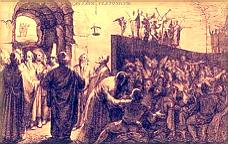 Plato envisioned a just government as one which was ruled by educated philosophers or by a philosopher-king. In his famous “Myth of the Cave,” people are chained in a cave with a fire behind them. When others pass in front of the fire, they can see shadows on the cave wall, and falsely believe that these shadows represent reality. According to Plato, the purpose of the ruler should be to enlighten the masses and show them the truth behind these shadowy images.
Plato envisioned a just government as one which was ruled by educated philosophers or by a philosopher-king. In his famous “Myth of the Cave,” people are chained in a cave with a fire behind them. When others pass in front of the fire, they can see shadows on the cave wall, and falsely believe that these shadows represent reality. According to Plato, the purpose of the ruler should be to enlighten the masses and show them the truth behind these shadowy images.In Politics, Aristotle, too, was critical of the democratic system. He described the various models of ruling thus:
“Of forms of government in which one rules, we call that which regards the common interests, monarchy; that in which more than one, but not many, rule, aristocracy (and it is so called, either because the rulers are the best men, or because they have at heart the best interests of the state and of the citizens). But when the citizens at large administer the state for the common interest, the government is called a polity. And there is a reason for this use of language.
“Of the above-mentioned forms, the perversions are as follows: of monarchy, tyranny; of aristocracy, oligarchy; of polity, democracy. For tyranny is a kind of monarchy which has in view the interest of the monarch only; oligarchy has in view the interest of the wealthy; democracy, of the needy: none of them the common good of all. Tyranny, as I was saying, is monarchy exercising the rule of a master over the political society; oligarchy is when men of property have the government in their hands; democracy, the opposite, when the indigent, and not the men of property, are the rulers.”
Although the potential for abuse of power and tyranny is indeed there in the democratic model, this potential exists in other forms of government, too. What Plato failed to see was that it could be possible to institute constraints on democracy that would limit some of its potential downsides, although not eliminate them completely. The American Founding Fathers, too, were skeptical of “democracy” in the meaning of unconstrained direct democracy, which they, like Plato, perceived could quickly disintegrate into mob rule. They outlined a constitutional Republic with indirect, representative democracy defined by a constitution. Citizens would be governed by the rule of law, thus protecting the minority from abuse and the potential tyranny of the majority. John Adams defined this as “a government of laws, and not of men.”
 The Constitution of the United States was inspired by the French Enlightenment thinker Montesquieu, famous for his theory of the separation of powers into branches: The executive, the legislature, and the judiciary, with checks and balances among them. The USA has strong separation of powers, whereas many European countries typically have parliamentary democracies with weaker separation, since the executive branch, the government, is dependent on the legislature. Democracy strengthened by such constraints and individual rights has worked reasonably well, but like all other human inventions it isn’t perfect. The system still has its critics. In How the West Was Lost, author Alexander Boot outlines what he thinks ails the modern West. It is a provocative book. I disagree with some of his criticism of post-Enlightenment civilization in general, but Boot is articulate and original; some of his points about the nature of the modern state are worth contemplating.
The Constitution of the United States was inspired by the French Enlightenment thinker Montesquieu, famous for his theory of the separation of powers into branches: The executive, the legislature, and the judiciary, with checks and balances among them. The USA has strong separation of powers, whereas many European countries typically have parliamentary democracies with weaker separation, since the executive branch, the government, is dependent on the legislature. Democracy strengthened by such constraints and individual rights has worked reasonably well, but like all other human inventions it isn’t perfect. The system still has its critics. In How the West Was Lost, author Alexander Boot outlines what he thinks ails the modern West. It is a provocative book. I disagree with some of his criticism of post-Enlightenment civilization in general, but Boot is articulate and original; some of his points about the nature of the modern state are worth contemplating.For example, he says, “The word ‘democracy’ in both Greece and Rome had no one man one vote implications and Plato used it in the meaning of ‘mob rule.’ The American founding fathers never used it at all and neither did Lincoln. (…) a freely voting French citizen or British subject of today has every aspect of his life controlled, or at least monitored, by a central government in whose actions he has little say. He meekly hands over half his income knowing the only result of this transfer will be an increase in the state’s power to extort even more. (...) He opens his paper to find yet again that the ‘democratic’ state has dealt him a blow, be that of destroying his children’s education, raising his taxes, devastating the army that protects him, closing his local hospital or letting murderers go free. In short, if one defines liberty as a condition that best enables the individual to exercise his freedom of choice, then democracy of universal suffrage is remiss on that score.”
Boot also warns against the increasing prevalence of Politically Correct censorship through hate speech laws: “Laws against racism are therefore not even meant to punish criminal acts. They are on the books to reassert the power of the state to control not just the citizens’ actions but, more important, their thoughts and the words they use to get these across. (…) A state capable of prosecuting one person for his thoughts is equally capable of prosecuting thousands, and will predictably do so when it has consolidated its power enough to get away with any outrage. (…) It is relatively safe to predict that, over the next ten years, more and more people in Western Europe and North America will be sent to prison not for something they have done, but for something they have said.”
Lee Harris, the author of The Suicide of Reason, wonders what were the necessary conditions for the growth of modern reason. This was the question taken up by Johann Herder:
“What kind of culture was necessary in order to produce a critical thinker like Immanuel Kant himself? When Kant, in his Critique of Pure Reason, methodically demolished all the traditional proofs for the existence of God, why wasn’t he torn limb from limb in the streets of Königsburg by outraged believers?”
Cynics would argue that they simply didn’t understand his eight hundred page thesis, which isn’t exactly light reading, as those who have attempted to digest his writings can testify. Although Kant had the freedom to do this in 18th-century Europe, he would probably have been killed had he attempted the same thing in the Islamic world, which is one of the reasons why the Scientific and Industrial Revolutions took place in the West, and not under Islam.
 So how do we treat freethinkers asking sensitive questions in the 21st century West? In my own country, the Ombud for Gender Equality recently became The Equality and Anti-discrimination Ombud. Its duties include combating “discriminatory speech” and negative statements about other cultures and religions. If accused of such discrimination, one has to mount proof of innocence. In effect, this institution is a secular or Multicultural Inquisition: the renunciation of truth in favor of an ideological lie. Galileo Galilei faced the same choice during the Inquisition four hundred years earlier. The Multicultural Inquisition may not threaten to kill you, but it does threaten to kill your career, and that goes a long way in achieving the same result, whether your crime is claiming that the earth moves around the sun or that not all cultures are equal.
So how do we treat freethinkers asking sensitive questions in the 21st century West? In my own country, the Ombud for Gender Equality recently became The Equality and Anti-discrimination Ombud. Its duties include combating “discriminatory speech” and negative statements about other cultures and religions. If accused of such discrimination, one has to mount proof of innocence. In effect, this institution is a secular or Multicultural Inquisition: the renunciation of truth in favor of an ideological lie. Galileo Galilei faced the same choice during the Inquisition four hundred years earlier. The Multicultural Inquisition may not threaten to kill you, but it does threaten to kill your career, and that goes a long way in achieving the same result, whether your crime is claiming that the earth moves around the sun or that not all cultures are equal.Has liberty regressed during the past two hundred years? How was it possible that Immanuel Kant, who lived in a German state without liberal democracy, could criticize basic aspects of religion in the 18th century, while in the West of the 21st century there are social and legal consequences for criticizing other religions and cultures? It is a mistake to assume that liberty (in the meaning of freedom of speech and conscience) derives of necessity from a democracy of universal suffrage. Do we need a new Enlightenment to fill the vacuum formed by the fall of Political Correctness?
I have made a list of suggested conditions for a functioning democratic system:
- There must be a demos. That is, there must be a group of people with a shared pre-political loyalty. This common understanding would include mutual identification and trust between leaders who implement policies and the general public. There must be sanctions in place to allow the demos to hold accountable or remove incompetent or corrupt officials. The growth of supranational institutions has weakened the connections between the members of the elite and the nation states they are supposed to serve. The demos has been attenuated by both Multiculturalism and mass immigration.
- In the demos, there has to be true freedom of speech. There have to be genuine debates about crucial issues. For a combination of reasons, this process is now severely curtailed in many Western countries. Activists on the Left demand formal and informal censorship of sensitive issues. Meanwhile, the media isn’t functioning as a counterweight to the political elites because it frequently is in lockstep with these elites.
- In the demos, there should be no significant Muslim presence. Islam is toxic to a democratic society for several reasons, which I will explore later. One is the possibility of physical attack against anybody who criticizes the Islamic agenda. The fear thus engendered destroys any possibility of a free, civil public discourse. Another is the resentment generated by Muslim demands for separate laws and “special treatment,” demands which are driven by an inherent sense of entitlement. Finally, there is the harassment of non-Muslims, even those who do not criticize Islam. This aggressive behavior is always part and parcel of Jihad.
- The territorial entity where the demos lives must control its own borders. A nation that fails to discriminate between citizens and non-citizens, between members and non-members of the demos, will cease to function.
What is disturbing about this list is that in the West - particularly Western Europe - few of these conditions remain. We are no longer citizens; we are subjects, mere spectators to destinies others have chosen for us. We are citizens only if we have genuine influence over how our tax money is spent. We are subjects when we just pay taxes while others decide what to do with this money.
The control of borders and the sovereignty of nation states are linked to the list above. Democratic decisions are meaningless if they can be overruled by an external authority. This notion of sovereignty is being challenged all over the Western world both through the United Nations and through the ascendence of international law. Sovereignty is clearly not present in much of Europe, where seventy percent or more of all laws passed are federal EU laws. Democratically elected national parliaments have been reduced to insignificance. It is thus possible to argue that Western European countries are no longer distinct democracies, nor are they part of the “Free World” in any meaningful sense. Europeans thus have universal suffrage, but we don’t have genuine democracy and we certainly don’t have true liberty.
- - - - - - - - - -
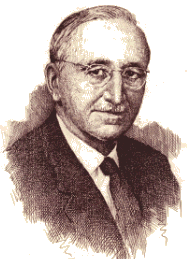 Why is the European Union not democratic? One element is its sheer size; another is the massive bureaucracy that has grown up around it. As F.A. Hayek writes in The Road to Serfdom:
Why is the European Union not democratic? One element is its sheer size; another is the massive bureaucracy that has grown up around it. As F.A. Hayek writes in The Road to Serfdom:“Least of all shall we preserve democracy or foster its growth if all the power and most of the decisions rest with an organisation far too big for the common man to survey or comprehend. Nowhere has democracy ever worked well without a great measure of local self-government, providing a school of political training for the people at large as much as for their future leaders. It is only where responsibility can be learnt and practised in affairs with which most people are familiar, where it is awareness of one’s neighbour rather than some theoretical knowledge of the needs of other people which guides action, that the ordinary man can take a real part in public affairs because they concern the world he knows. Where the scope of the political measures become so large that the necessary knowledge is almost exclusively possessed by the bureaucracy, the creative impulses of the private person must flag.”
It can’t all be about size, since the system has worked somewhat better in the United States. The most important reason for this democratic deficit in Europe is the lack of any formal constraints on the power of leading EU organs. In 2006, for the twelfth year in a row the European Court of Auditors, the EU’s official financial watchdog, refused to approve the EU budget because it was so full of fraud and errors. Half the project budgets approved by the European Commission were inadequately monitored.
This story of fraudulence was largely ignored by Europe’s media. The powerful European Commission is the EU’s “government,” and thus the government of nearly half a billion people from Hungary to Britain and from Finland to Spain, yet it can release accounts with massive flaws for over a decade straight. Such lack of oversight would have been unthinkable in the USA. The EU Commission gets away with it because it is largely unaccountable to anyone and was intentionally structured to operate this way in the first place. Just like the Politburo of the former Soviet Union, the EU Commission is not subject to any real checks and balances.
It is obviously easier to establish democracy in a small and transparent nation state than in a larger one. However, Sweden - the Western country where people pay the highest tax rates - is also arguably the most politically repressed nation and has the least real freedom of speech. Sweden’s problem is not its geographical size, but the bloated state apparatus. Perhaps limitations on bureaucracy, government influence and intrusion are crucial for a functioning democracy, too. In a traditional pre-modern state, the ruler might not always have ruled with your consent, but he largely left you alone as long as you paid your taxes. Not so in our modern democratic nations. Our schools are increasingly filled with courses disparaging our own indigenous cultural heritage while they praise Islamic “tolerance.” We are barred from bringing up our own children and instilling in them our values. Is this liberty?
 Øystein Djupedal, Minister of Education and Research in Norway’s Socialist Leftist Party, stated in public that: “I think that it’s simply a mistaken view of child-rearing to believe that parents are the best to raise children. Children need a village, said Hillary Clinton. But we don’t have that. The village of our time is the kindergarten.” Following public reactions, he later retracted this statement. Critics would claim that the government treats the entire country as a kindergarten. The Ministry of Education and Research in Norway is responsible for nursery education, primary and lower secondary education, day-care facilities for school children, upper secondary education and institutions of higher education such as universities. In other words, one bureaucracy controls everything Norwegians learn from kindergarten through the doctoral level.
Øystein Djupedal, Minister of Education and Research in Norway’s Socialist Leftist Party, stated in public that: “I think that it’s simply a mistaken view of child-rearing to believe that parents are the best to raise children. Children need a village, said Hillary Clinton. But we don’t have that. The village of our time is the kindergarten.” Following public reactions, he later retracted this statement. Critics would claim that the government treats the entire country as a kindergarten. The Ministry of Education and Research in Norway is responsible for nursery education, primary and lower secondary education, day-care facilities for school children, upper secondary education and institutions of higher education such as universities. In other words, one bureaucracy controls everything Norwegians learn from kindergarten through the doctoral level.There is a crucial reason why the European Union isn’t democratic: There is no European demos. Most people in Europe identify themselves as Italian, Spanish, Dutch or Polish. The notion of being a European is at best a very distant second. In contrast, United States citizens consider themselves Americans, although Multiculturalism encourages dual identities, in which individuals are African-American, Asian-American etc. This tribalization represents a critical long-term challenge to the continued quality of American democracy. It is conceivable that the backlash could cause the country to fall apart if the white majority, too, decides to view itself as a tribal group of European-Americans. Mr. Carl I. Hagen of the right-wing Progress Party criticized the choice of a foreign citizen to head Norway’s immigration agency. Eva Joly, a Norwegian born French magistrate, known in France for her crusade against corruption, disagreed with Hagen: “To assume that nationality or citizenship have anything to do with being suitable [for a job] is a very old-fashioned way of thinking. We are no longer thinking in national terms, but in European or global terms. It is a duty to employ people from other countries,” said Joly. She has been granted both Norwegian and French citizenship, but considers herself European.
When we elect people to important positions, we want them to take care of our interests, not ephemeral “global interests.” How can we rely on the people entrusted to work for us if they openly state that they don’t feel any loyalty towards our country? According to British philosopher Roger Scruton, members of our liberal elite may be immune to xenophobia, but there is an equal fault which they exhibit in abundance, which is oikophobia, the repudiation and fear of home.
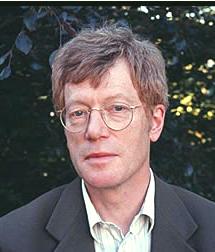 In his book The West and the Rest: Globalization and the Terrorist Threat, Scruton believes that what characterizes the West is our idea of the personal state:
In his book The West and the Rest: Globalization and the Terrorist Threat, Scruton believes that what characterizes the West is our idea of the personal state:“The personal state is characterized by a constitution, by a rule of law, and by a rotation of office-holders. Its decisions are collectively arrived at by a process that may not be wholly democratic, but which nevertheless includes every citizen and provides the means whereby each citizen can adopt the outcome as his own. Personal states have an inherent preference for negotiation over compulsion, and for peace over war. [The personal state] is answerable to its citizens, and its decisions can be imputed to them not least because they, as citizens, participate in the political process.”
For this democratic process to work there has to be a loyalty and identity that precedes political allegiance. We must have a community that has primary common interests. This has no real counterpart in Islamic countries, where the ideal is the global Ummah and the Caliphate. Concepts such as the nation state or territorial integrity have no equivalent in Islamic jurisprudence, which helps explain why democracy is so hard to establish in Muslim countries.
Scruton notes, however, that the Western personal state is now under pressure from two directions. Supranational institutions are destroying the sense of membership from above, while massive immigration without assimilation is destroying it from below. The European Union, among others, “is rapidly destroying the territorial jurisdictions and national loyalties that have, since the Enlightenment, formed the basis of European legitimacy, while putting no new form of membership in their place.” And although it makes sense for individuals travelling from Third World countries to settle in the West, they may thus unwittingly contribute to destroying what they came to enjoy the benefits of in the first place:
“The political and economic advantages that lead people to seek asylum in the West are the result of territorial jurisdiction. Yet territorial jurisdictions can survive only if borders are controlled. Transnational legislation, acting together with the culture of repudiation, is therefore rapidly undermining the conditions that make Western freedoms durable.”
Scruton comments that for the first time in centuries Islam appears to be “a single religious movement united around a single goal,” and that “one major factor in producing this unwonted unity is Western civilization and the process of globalization that it has set in motion.” According to him, this is a result of “Western prosperity, Western legal systems, Western forms of banking, and Western communications that human initiatives now reach so easily across frontiers to affect the lives and aspirations of people all over the globe.”
 Thus we have the irony in which “Western civilization depends on an idea of citizenship that is not global at all, but rooted in territorial jurisdiction and national loyalty.” By contrast, Islam, which has been until recently remote from the Western world, is founded on an ideal “which is entirely global in its significance.” Globalization, therefore, “offers militant Islam the opportunity that it has lacked since the Ottoman retreat from central Europe.” It has brought into existence “a true Islamic umma, which identifies itself across borders in terms of a global form of legitimacy, and which attaches itself like a parasite to global institutions and techniques that are the by-products of Western democracy.”
Thus we have the irony in which “Western civilization depends on an idea of citizenship that is not global at all, but rooted in territorial jurisdiction and national loyalty.” By contrast, Islam, which has been until recently remote from the Western world, is founded on an ideal “which is entirely global in its significance.” Globalization, therefore, “offers militant Islam the opportunity that it has lacked since the Ottoman retreat from central Europe.” It has brought into existence “a true Islamic umma, which identifies itself across borders in terms of a global form of legitimacy, and which attaches itself like a parasite to global institutions and techniques that are the by-products of Western democracy.”Scruton raises some difficult questions: Does globalization make it easier for Muslims to realize the idea of a global Islamic community, which has always been an ideal but far from a practical reality? Does it also put pressure on the territorial integrity of coherent nation states? If so, does globalization strengthen Islam while it weakens Western democracy? These questions are difficult to think about, but for the sake of survival we need to ask them and find an honest answer.
Globalization doesn’t necessarily mean that Islam will win. In the long run, it is quite possible that mass communications and the exposure to criticism will destroy Islam, but it could ironically make it more dangerous in the short term.
Is Islam compatible with democracy? Justice Minister Piet Hein Donner strongly disagrees with a plea for a ban on parties seeking to launch Islamic law in the Netherlands. “For me it is clear: if two-thirds of the Dutch population should want to introduce the sharia tomorrow, then the possibility should exist.”
This dilemma can be solved by stating the following: Our goal is not democracy in itself, meaning elections and one man one vote, but freedom of conscience and speech, respect for property rights and minorities, the right to bear arms and self-defense, equality before the law and the rule of law - and by that I mean secular law - in addition to such principles as formal constraints on the power of the rulers and the consent of the people. Free elections may be a means of achieving this end, but it is not the end in itself. We shouldn’t confuse the tools with the primary goal.
Two central concepts in sharia are the notions of “blasphemy” and “apostasy,” both incurring the death penalty. These laws are incompatible with the ancient Western ideas of freedom of conscience and of speech. Thus, sharia is anathema to the goals of democracy. Sharia is also hostile to equality before the law, since Islamic law is based on the fundamental inequality between Muslims and non-Muslims, men and women, free men and slaves. Moreover, it does not provide any protection for minorities, since non-Muslims are supposed to be unarmed and their lives and property subject to the whims of Muslims at any given moment. Although Islam does contain the vague Koranic notion of shura, consultation, this has never been formalized or concretized, which means that there are no formal constraints on the power of the ruler under sharia. The only thing an Islamic ruler may not do is openly to reject Islam.
According to Salim Mansur, associate professor of political science at the University of Western Ontario, Canada, “Democracy is in a cultural sense an expression of the liberal modern world that situates the individual as the moral center of politics and society. (…) It is the idea of the inalienable rights located in the individual, rights that need to be protected, nurtured, and allowed the fullest unhindered expression that makes democracy so morally distinctive from other cultural systems. From this liberal perspective, the common error about democracy is to view it as a majority system of governance. In a democracy based on individual rights, on the contrary, it is the protection of the rights of minorities and dissidents that reflect the different nature of politics within the larger context of democratic culture.”
This definition is opposed to an illiberal democracy, which is “similar to what Samuel E. Finer, a professor of politics and government, wrote about in Comparative Government as ‘façade democracy,’ a bowing of the head to the idea of democracy by the tiny elite of those in power as a means to enhance their legitimacy and perpetuate their authority.”
One great obstacle to establishing democracy in this cultural sense in Muslim countries is that Muslims have been taught from birth that non-Muslims can’t be expected to enjoy the same kind of rights as Muslims do.
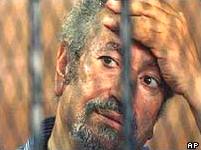 The Wall Street Journal ran a piece entitled “Reviving Mideastern Democracy: We Arabs Need the West’s Help to Usher in a New Liberal Age.” It was written by Saad Eddin Ibrahim, chairman of the board of the Ibn Khaldun Center for Development Studies in Cairo, who has been jailed several times for his pro-democracy work in Egypt. Mr. Ibrahim thinks the prospects for democracy in the Middle East are surprisingly good:
The Wall Street Journal ran a piece entitled “Reviving Mideastern Democracy: We Arabs Need the West’s Help to Usher in a New Liberal Age.” It was written by Saad Eddin Ibrahim, chairman of the board of the Ibn Khaldun Center for Development Studies in Cairo, who has been jailed several times for his pro-democracy work in Egypt. Mr. Ibrahim thinks the prospects for democracy in the Middle East are surprisingly good:“In previous decades, authoritative voices said that Germany, Japan, Slavic countries and even Catholic societies would never, could never, be democratic. I am not speaking of popular prejudices here, but of high-level scholarship and expert consensus. Batteries of learned naysayers honestly believed that there was something about German, Japanese or Slavic culture, or about Catholicism, that was fundamentally and unchangeably hostile to democracy and democratic values. . . .”
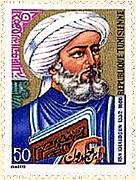 But in the words of the celebrated 14th century historian Ibn Khaldun himself: “in the Muslim community, the holy war is a religious duty, because of the universalism of the Muslim mission and (the obligation to) convert everybody to Islam either by persuasion or by force.” In Islam, says Ibn Khaldun, the person in charge of religious affairs is concerned with “power politics,” because Islam is “under obligation to gain power over other nations” (Muqaddimah, trans. Rosenthal, p. 183).
But in the words of the celebrated 14th century historian Ibn Khaldun himself: “in the Muslim community, the holy war is a religious duty, because of the universalism of the Muslim mission and (the obligation to) convert everybody to Islam either by persuasion or by force.” In Islam, says Ibn Khaldun, the person in charge of religious affairs is concerned with “power politics,” because Islam is “under obligation to gain power over other nations” (Muqaddimah, trans. Rosenthal, p. 183).As Robert Spencer commented, “Those are not words of openness, tolerance, and democracy. And they are still widely held in the Muslim world.”
Ibn Khaldun wrote about Christians: “We do not think that we should blacken the pages of this book [Muqaddimah] with discussion of their [Christian] dogmas of unbelief. In general, they are well known. All of them are unbelief. This is clearly stated in the noble Koran. To discuss or argue those things with them is not up to us. It is for them to choose between conversion to Islam, payment of the poll tax, or death.”
According to Dr. Andrew Bostom in his book The Legacy of Jihad (page 29), “In The Laws of Islamic Governance al-Mawardi (d. 1058), also examines the regulations pertaining to the lands and infidel (i.e., non-Muslim) populations subjugated by jihad. This is the origin of the system of dhimmitude. The native infidel population had to recognize Islamic ownership of their land, submit to Islamic law, and accept payment of the poll tax (jizya). Al-Mawardi highlights the most significant aspect of this consensus view of the jizya in classical Islamic jurisprudence: the critical connection between jihad and payment of the jizya. He notes that “[t]he enemy makes a payment in return for peace and reconciliation.” Al-Mawardi then distinguishes two cases: (1) Payment is made immediately and is treated like booty, however “it does, however, not prevent a jihad being carried out against them in the future” (2) Payment is made yearly and will “constitute an ongoing tribute by which their security is established.” Reconciliation and security last as long as the payment is made. If the payment ceases, then the jihad resumes.”
There are also other limitations on dhimmis. In 2005 it was announced that the first Christian church in Qatar since the 7th century was to be built on land donated by the reform-minded Emir. The church will not have a spire or freestanding cross, in accordance with traditional dhimmi laws where Christians are forbidden to display crosses. Clive Handford, the Nicosia-based Anglican Bishop in Cyprus and the Gulf, said: “We are there as guests in a Muslim country and we wish to be sensitive to our hosts ... but once you’re inside the gates it will be quite obvious that you are in a Christian center.” Christianity was eradicated from most Gulf Arab states within a few centuries of the arrival of Islam.
 Even in Malaysia, one Muslim majority country frequently hailed as “moderate and tolerant,” hundreds of Hindu worshippers watched in horror as workers, mostly Muslims, brought down the roof of their temple and smashed the deities that immigrant Indian workers had brought with them. “We are poor and our only comfort is our temples and now we are losing that also,” Kanagamah said in Tamil, the language spoken by ethnic Indians who form eight percent of Malaysia’s 26 million people and mostly follow Hinduism.
Even in Malaysia, one Muslim majority country frequently hailed as “moderate and tolerant,” hundreds of Hindu worshippers watched in horror as workers, mostly Muslims, brought down the roof of their temple and smashed the deities that immigrant Indian workers had brought with them. “We are poor and our only comfort is our temples and now we are losing that also,” Kanagamah said in Tamil, the language spoken by ethnic Indians who form eight percent of Malaysia’s 26 million people and mostly follow Hinduism.“The demolitions are indiscriminate, unlawful and against all constitutional guarantees of freedom of worship,” according to human rights lawyer P. Uthayakumar. He said temples are demolished by the authorities as illegal structures but the same authorities make it impossible for devotees to get a permit. He cited the case of a Catholic church nearby which got a permit to build a church after 30 years of trying. “What does this say about freedom of worship?” he asked. Well, it says that Muslim authorities are still operating according to the classic provision of the dhimmi laws, that non-Muslims must not build new houses of worship or repair old ones.
According to Sita Ram Goel, Imam Hanifa “had recommended that Hindus, though idolaters, could be accepted as a ‘People of the Book’ like the Jews, the Christians and the Zoroastrians, and granted the status of zimmis. The Muslim swordsmen and theologians in India happened to follow his school of Islamic law. That enabled them to ‘upgrade’ the ‘crow-faced infidels’ of this country to the status of zimmis. Hindus could save their lives and some of their properties, though not their honour and places of worship and pilgrimage, by paying jizyah and agreeing to live under highly discriminative disabilities. The only choice which the other great Imams of Islam - Malik, Shafii and Hanbal [the founders of the four Sunni Islamic schools of jurisprudence] - gave to the Hindus was between Islam and death.”
From Western apologists we often hear that the “communal strife” on the Indian subcontinent is “mutual.” If this is the case, why is it that in Pakistan non-Muslims have been all but wiped out, and the few remaining Christians and Hindus suffer continuous harassment and abuse? The population of Bangladesh was about thirty percent non-Muslim a few decades ago. Now that number is down to ten percent. Contrast this decline with the fact, due to higher birthrates, the number of Muslims within the Republic of India has actually increased during the same period. Do these statistics indicate “mutual hostility” or simply persecution of infidels?
In Pakistan’s Sindh province there is an alarming trend: Muslims kidnap Pakistani Hindu girls and force them to convert to Islam. The worried resident Hindu community has resorted to marrying off their daughters as soon as they are of age. Alternatively, they migrate to India, Canada or other nations. Recently, at least 19 such abductions have occurred in Karachi alone.
“Have you ever heard of an Indian Muslim girl being forced to embrace Hinduism? It’s Muslims winning by intimidation. It’s Muslims overcoming a culture by threatening it, by abducting young girls so that an entire community moves out or succumbs to the Muslim murderers,” human rights activist Hina Jillani says. Hindus and Christians in Pakistan are looked down upon. “That is why they have to take up inferior jobs; their chances of rising in any field are low.”
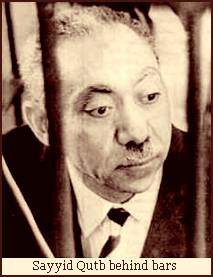 The Muslim superiority syndrome runs deep. In Milestones, the Egyptian Sayyid Qutb writes about “a triumphant state which should remain fixed in the Believer’s heart” in the face of every thing. “It means to feel superior to others when weak, few and poor, as well as when strong, many and rich.”
The Muslim superiority syndrome runs deep. In Milestones, the Egyptian Sayyid Qutb writes about “a triumphant state which should remain fixed in the Believer’s heart” in the face of every thing. “It means to feel superior to others when weak, few and poor, as well as when strong, many and rich.”“When the Believer scans whatever man, ancient or modern, has known, and compares it with his own law and system, he realizes that all this is like the playthings of children or the searchings of blind men in comparison with the perfect system and the complete law of Islam. And when he looks from his height at erring mankind with compassion and sympathy at its helplessness and error, he finds nothing in his heart except a sense of triumph over error and nonsense. (…) Conditions change, the Muslim loses his physical power and is conquered, yet the consciousness does not depart from him that he is the most superior. If he remains a Believer, he looks upon his conqueror from a superior position. He remains certain that this is a temporary condition which will pass away and that faith will turn the tide from which there is no escape.”
Underlying this Muslim supremacist mentality, there is also the idea of Arab supremacy. Again according to Qutb, “What are the Arabs without Islam? What is the ideology that they gave, or they can give to humanity if they abandon Islam? The only ideology the Arabs advanced for mankind was the Islamic faith which raised them to the position of human leadership. If they forsake it they will no longer have any function or role to play in human history.”
Of course, there are those who would dismiss Sayyid Qutb as “an extremist,” since his writings such as Milestones and especially In the Shade of the Qur’an have inspired countless Jihadists since his execution at the hands of Gamal Abdel Nasser’s regime in 1966. But Qutb’s ideas about Muslim supremacy are on firm Islamic grounds.
According to Hugh Fitzgerald, “within Islam, a supposedly universalist religion where all Muslims in the ummah are equal, there is a special place for the Arabs.” The Koran is written in Arabic, and “was delivered to, given to, revealed to, the Arabs, that best of people. That best of men, Muhammad, was an Arab, and so were the Companions. The Qur’an itself should ideally not be read in any language other than Arabic (the Arabic in which it was written, not in any simplified or updated version). Qur’anic recitation is in Arabic. The students in Pakistan or Indonesia or elsewhere who pass their young lives memorizing Qur’anic passages are essentially memorizing Arabic, a language that they do not know at all, or understand most imperfectly. Yet it is 7th century Arabs, real or imaginary, who must serve as a guide to existence. (…) In Saudi Arabia there is apartheid: the signs ‘Muslim’ and ‘Non-Muslim’ are everywhere. But ‘Muslims’ are further divided into Arab (first class) and non-Arab (second class). This has not escaped the attention of the many Muslim non-Arabs who live in Saudi Arabia - or at least not the attention of all of them.”
This Arab supremacy is underestimated by infidels as a weapon against Islam: “Part of weakening Islam is to show many Muslims that Islam was simply an Arab invention and export, a poisoned chalice that has lain low higher, and superior civilizations. This is likely to resonate especially in Iran among those who have had their fill of the Islamic Republic of Iran - that is, every thinking and morally aware person in Iran.”
In Morocco, activists complain that Berber influence in political and economic life remains limited. “We’re not Arabs, bring out the real history,” chanted hundreds of Moroccan Berbers during Labor Day marches with slogans in their Tamazight language and banners written in Tifinagh, the Berber script. Berbers are the original inhabitants of North Africa, before the Arabs invaded in the seventh century. The Moroccan constitution says the country is Arab and Islam is its religion. The proportion of Berbers is not officially known but independent sources say they represent the majority of the population. The total population of Berbers in the world is estimated at twenty-five million, mainly concentrated in Algeria, Libya, Mali, Mauritania, Niger and Tunisia.
Islamic ideas about inequality are already being exported to the West. Two men were killed in a row involving a group of second generation immigrants in Copenhagen, Denmark, in 2005. According to imam Abu Laban (who was later responsible for whipping up hatred against his country of residence because of the now famous cartoons of Muhammad in Danish newspaper Jyllands-Posten) the thirst for revenge could be cooled if 200,000 kroner were paid by the family of the man who fired the shots. 200,000 Danish kroner is approximately the value of 100 camels, a number based on the example of Muhammad himself. The idea of blood money originates from the Koran, 2.178: O ye who believe! Retaliation is prescribed for you in the matter of the murdered; the freeman for the freeman, and the slave for the slave, and the female for the female. And for him who is forgiven somewhat by his (injured) brother, prosecution according to usage and payment unto him in kindness.
Politiken, a left-leaning, intellectual newspaper championing multiculturalism in Denmark, argued that the principle of blood money might be worth considering. Luckily, they were met by an outcry from angry citizens. There are at least two major problems with this Islamic “justice.” The first is that it is settled between families, tribes or clans, not in a justice system administered by the authorities where it is a matter concerning the individuals involved, not the entire clan. We had similar tribal vendettas in the West at one time, but we left this practice behind a long time ago, as Muslims should have done. The biggest problem will come if this tribal system were to undermine the Western justice system to the extent that Westerners, too, would revert to tribal law in order to protect themselves.
Many commentators in Denmark failed to understand the worst part of the blood money concept. Not only is it pre-modern and anti-individualistic, but the compensation to be paid is fundamentally inegalitarian. Muslim men are the only full members of the Islamic community. All others have fewer rights due to their religion, their sex or their slave status.
The rates for blood money mirror this apartheid system. A Saudi court has ruled that the value of one woman’s life is equal to that of one man’s leg. The court ordered a Saudi to pay a Syrian expatriate blood money after he killed the man’s wife and severed both his legs in a car accident six months earlier. The court ordered $13,300 compensation for the man’s wife, and the same amount for each of his legs. Under Islamic law, the life of an ex-Muslim is worth nothing at all. He is a traitor, an apostate, and can be killed with impunity.
In the April 9, 2002 issue, The Wall Street Journal published the concept of blood money in Saudi Arabia. If a person has been killed or caused to die by another, the latter has to pay blood money or compensation as follows:
- 100,000 riyals if the victim is a Muslim man
- 50,000 riyals if a Muslim woman
- 50,000 riyals if a Christian man
- 25,000 riyals if a Christian woman
- 6,666 riyals if a Hindu man
- 3,333 riyals if a Hindu woman
In a Saudi school textbook, after the intolerance was supposedly removed, the 10th-grade text on jurisprudence said: “Blood money for a free infidel. [Its quantity] is half of the blood money for a male Muslim, whether or not he is ‘of the book’ or not ‘of the book’ (such as a pagan, Zoroastrian, etc).
“Blood money for a woman: Half of the blood money for a man, in accordance with his religion. The blood money for a Muslim woman is half of the blood money for a male Muslim, and the blood money for an infidel woman is half of the blood money for a male infidel.”
As Ali Sina says, “According to this hierarchy, a Muslim man’s life is worth 33 times that of a Hindu woman. This hierarchy is based on the Islamic definition of human rights and is rooted in the Quran and Sharia (Islamic law). How can we talk of democracy when the concept of equality in Islam is inexistent?”
He thinks that the Islamic system of government is akin to Fascism:
- It is marked by centralization of authority under a supreme leader vested with divine clout.
- It has stringent socioeconomic control over all aspects of all its subjects irrespective of their faith.
- It suppresses its opposition through terror and censorship.
- It has a policy of belligerence towards non-believers.
- It practices religious apartheid.
- It disdains reason.
- It is imperialistic.
- It is oppressive.
- It is dictatorial and
- It is controlling.
According to Sina, “Islam is political and political Islam is Fascism.”
At Ryerson University in Toronto, Canada, Muslims are displaying their superiority syndrome.
The largest student group on campus, the Muslim Students’ Association, has monopolized use of the multifaith room. Eric Da Silva, president of the Catholic Student Association, said the group looked into using the room for mass but was told by RSU front desk staff that the room was “permanently booked” by Muslim students. “No one is trying to take away the space from the Muslims, we just don’t want to be stepping on their toes,” said Da Silva. He stressed that the group found another space to hold mass and the conflict was quickly resolved. The space, which was divided to separate males from females, had rows taped on the floor for prayer and Islamic decorations adorning the walls, was only accommodating to Muslims. A Canadian Federation of Students task force tackling cultural and religious discrimination was brought to campus by members of the MSA, but it only addressed the problem of Islamophobia.
Raymond Ibrahim, a research librarian at the US Library of Congress, warns in the Los Angeles Times against giving in to Muslim supremacists:
“In the days before Pope Benedict XVI’s visit to the Hagia Sophia complex in Istanbul, Muslims and Turks expressed fear, apprehension and rage. ‘The risk,’ according to Turkey’s independent newspaper Vatan, ‘is that Benedict will send Turkey’s Muslims and much of the Islamic world into paroxysms of fury if there is any perception that the pope is trying to re-appropriate a Christian center that fell to Muslims.’ Apparently making the sign of the cross or any other gesture of Christian worship in Hagia Sophia constitutes such a sacrilege. Built in the 6th century, Hagia Sophia - Greek for Holy Wisdom’ - was Christendom’s greatest and most celebrated church. After parrying centuries of jihadi thrusts from Arabs, Constantinople - now Istanbul - was finally sacked by Turks in 1453, and Hagia Sophia’s crosses were desecrated, its icons defaced.”
The Turks didn’t have to worry. The Pope behaved in perfect dhimmi fashion during his visit to the formerly Greek, Christian territory now known as Turkey. Ibrahim believes that “The West constantly goes out of its way to confirm such convictions. By criticizing itself, apologizing and offering concessions - all things the Islamic world has yet to do - the West reaffirms that Islam has a privileged status in the world.”
This blindness to the threat posed by the ingrained Islamic Superiority Syndrome has huge consequences when trying to export “democracy” to Islamic countries such as Iraq.
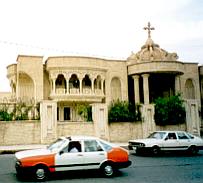 In September 2005, the patriarch of Baghdad for the Chaldeans told Iraqi officials about Catholic bishops’ fears that the constitution “opens the door widely” to discrimination against non-Muslims. Article 2.1(a) stated: “No law can be passed that contradicts the undisputed rules of Islam.” The bishops’ statement concluded: “This opens the door widely to passing laws that are unjust towards non-Muslims.” Glyn Ford, British MEP, joined former Tribune editor Mark Seddon and Andy Darmoo, head of Save the Assyrians, to sound the alarm on behalf of Assyrian Christians: “Prevented from voting in the elections, in recent months many have had their land occupied and stolen, their churches firebombed and their families attacked. Isn’t it time that the international community began championing the rights of Assyrians and other minorities before it is too late?”
In September 2005, the patriarch of Baghdad for the Chaldeans told Iraqi officials about Catholic bishops’ fears that the constitution “opens the door widely” to discrimination against non-Muslims. Article 2.1(a) stated: “No law can be passed that contradicts the undisputed rules of Islam.” The bishops’ statement concluded: “This opens the door widely to passing laws that are unjust towards non-Muslims.” Glyn Ford, British MEP, joined former Tribune editor Mark Seddon and Andy Darmoo, head of Save the Assyrians, to sound the alarm on behalf of Assyrian Christians: “Prevented from voting in the elections, in recent months many have had their land occupied and stolen, their churches firebombed and their families attacked. Isn’t it time that the international community began championing the rights of Assyrians and other minorities before it is too late?”A group of Muslim men seized a seven year old Mandaean boy, from an ancient Gnostic sect in Iraq, doused him in petrol and set him alight. As the child was being burnt to death the Muslims were running around shouting, “Burn the dirty infidel!” “Many women physicians have been killed, women in the police forces, reporters and journalists,” Rajaa al-Khuzai, president of the Iraqi National Council of Women said. Now “women are very easy targets,” especially high-profile women such as herself, she added. This oppression of women and non-Muslims is in full accordance with Islamic sharia and was depressingly predictable.
Although Christians made up less than four per cent of the population they formed the largest groups of refugees arriving in Jordan’s capital Amman in the first quarter of 2006. In Syria, forty-four percent of Iraqi asylum-seekers were recorded as Christian since December 2003. They were fleeing killings, kidnappings and death threats. “In the schools the children now say that a Christian is a kaffir [infidel].” The Catholic bishop of Baghdad, Andreos Abouna, was quoted as saying that half of all Iraqi Christians have fled the country since the 2003 US-led invasion. Some warned that in twenty years all Christians in Iraq will be gone. “It was easy for the Americans and the British to have supported us when the churches were bombed - it was a historic opportunity - but they did nothing. If they had supported us financially, for example, we could have protected all the Christian families in Mosul.”
U.S. President George W. Bush said he would accept it if Iraqis voted to create an Islamic fundamentalist government in democratic elections. “I will be disappointed, but democracy is democracy.”
Is it really equivalent, Mr. Bush?
This brings us back to Plato’s criticism of democracy as just an advanced form of mob rule. And without any constraints, checks and balances, that definition is correct. Benjamin Franklin said that “Democracy is two wolves and a lamb voting on what to have for lunch. Liberty is a well-armed lamb contesting the vote!” This is why he and the other Founding Fathers wanted the USA to be a constitutional Republic, not a pure democracy.
It is strange that the United States wanted to export to Iraq a naïve concept of democracy, one that provided too few rights and guarantees for individuals and minorities, one that their own Founding Fathers had specifically rejected for precisely that reason. And this did not even include an assessment of Islam, in which harassing and persecuting minorities and suppressing individual liberty is a matter of principle.
Non-Muslims and women in Iraq are now paying with their lives for that naïve mistake.
In his Islamic Declaration from 1970, where he demanded a fully-fundamentalist Muslim state, future Bosnian president Alija Izetbegovic wrote that “A Muslim generally does not exist as an individual. If he wishes to live and survive as a Muslim, he must create an environment, a community, an order. He must change the world or be changed himself. History knows of no true Islamic movement which was not at the same time a political movement as well.”
The late American scholar of Islam, Franz Rosenthal, said that an individual Muslim “was expected to consider subordination of his own freedom to the beliefs, morality and customs of the group as the only proper course of behavior. (…) The individual was not expected to exercise any free choice as to how he wished to be governed. In general, governmental authority admitted of no participation of the individual as such, who therefore did not possess any real freedom vis-à-vis it.”
Iranian ex-Muslim Ali Sina states that “Deindividuation is characterized by diminished awareness of self and individuality. In Islam individuality is denied and the individual’s life is fused with that of Umma. Deindividuation reduces an individual’s self-restraint and normative regulation of behavior. It contributes to the collective behavior of violent crowds, mindless hooligans, and the lynch mobs.” According to him, “Ironically it is the brutality and the repressive nature of Islam, in conjunction with its absolute irrationality that has made this doctrine successful and has allowed it to survive this long.”
But as the esteemed writer F.A. Hayek wrote in his classic The Road to Serfdom:
“What our generation is in danger of forgetting is not only that morals are of necessity a phenomenon of individual conduct, but also that they can exist only in the sphere in which the individual is free to decide for himself and called upon voluntarily to sacrifice personal advantage to the observance of a moral rule. Outside the sphere of individual responsibility there is neither goodness nor badness, neither opportunity for moral merit nor the chance of proving one’s conviction by sacrificing one’s desires to what one thinks right. Only where we ourselves are responsible for our own interests and are free to sacrifice them, has our decision moral value. Neither good intentions nor efficiency of organisation can preserve decency in a system in which personal freedom and individual responsibility are destroyed.”
A British police report concluded that complaints of misconduct and corruption against Muslim officers occur ten times more frequently than against their non-Muslim colleagues. The report argued that since British Pakistanis live in a cash culture in which “assisting your extended family is considered a duty” and in an environment in which large amounts of money are loaned between relatives and friends, police officers of Pakistani origin needed special anti-corruption training.
Only a small percentage of Pakistani citizens, and those of many other Muslim countries, actually pay taxes. There is a philosophy that ascribes no value to the individual; the clan is everything; the state is the enemy. This mentality underlies the behavior of the immigrants from these countries as they migrate, bringing with them to non-Muslim countries the corruption and tribal violence associated with this world view.
As Ali Sina says:
“Abu Hamid Al-Ghazali, (1058 - 1111 CE) is arguably the greatest Islamic scholar ever. In his book ‘Incoherence of the Philosophers’ he bitterly denounced Aristotle, Plato, Socrates and other Greek thinkers as non-believers and labeled those who employed their methods and ideas as corrupters of the Islamic faith. He took aim at Avicenna [Ibn Sina, highly influential 11th century Persian physician and philosopher] for being a rationalist who drew intellectually upon the Ancient Greeks. By emphasizing on the incompatibility of faith and reason, and by asserting the futility of making faith subordinate to reason, Ghazali gave validity to unreasoned faith and thus glorified stupidity.
“The Islamic rationalists such as Mutazilis placed reason above revelation. But their school was vehemently opposed by more fervent Islamists and became extinct. They were attacked by a group called Ashariyya to which al-Ghazali and the celebrated poet [Jalal ad-Din or Mawlana] Rumi belonged. Rumi mocked the rationalists and in a catchy verse that left its mark on the psyche of the gullible masses said the rationalists stand on ‘wooden legs.’”
Sina believes that “Freedom of speech, freedom of beliefs, respect for the rights of the minority and separation of religion from government are the foundations of democracy.” The West should insist on freedom of religion and freedom of speech both at home and abroad. “People must be allowed to criticize the views of the majority without fearing for their lives. There can’t be democracy without freedom of expression and without opposition. Before taking democracy to Islamic countries, let us save our own democracy at home.”
According to another ex-Muslim, Ibn Warraq, “Islam is a totalitarian ideology that aims to control the religious, social and political life of mankind in all its aspects - the life of its followers without qualification, and the life of those who follow the so-called tolerated religions to a degree that prevents their activities from getting in the way of Islam in any manner. And I mean Islam. I do not accept some spurious distinction between Islam and ‘Islamic fundamentalism’ or ‘Islamic terrorism.’ Given the totalitarian nature of Islamic law, Islam does not value the individual, who has to be sacrificed for the sake of the Islamic community. Collectivism has a special sanctity under Islam.”
The reason why many former Muslims such as Ali Sina and Ibn Warraq write under pseudonyms is that in a religion that is so hostile to both individuality and freedom of speech, there is no worse crime for a Muslim than to exercise both by criticizing and leaving Islam. Apostasy bears the penalty of death. In the book Leaving Islam - Apostates Speak Out, a unique anthology by former Muslims, Ibn Warraq writes that (p. 31):
“However, apostasy is a matter of treason and ideological treachery, which originates from hostility and hypocrisy. The destiny of a person who has an inborn handicap is different from the destiny of one whose hand should be cut off due to the development of a dangerous and infectious disease. The apostasy of a Muslim individual whose parents have also been Muslim is a very infectious, dangerous and incurable disease that appears in the body of an ummah (people) and threatens people’s lives, and that is why this rotten limb should be severed.”
The death penalty for apostasy from Islam is firmly rooted in Islamic texts - certainly in the hadith, but arguably also in the Koran. The Koran 4:89 states:
“They desire that you should disbelieve as they have disbelieved, so that you might be (all) alike; therefore take not from among them friends until they fly (their homes) in Allah’s way; but if they turn back, then seize them and kill them wherever you find them, and take not from among them a friend or a helper.”
Ibn Kathir’s (d. 1373) venerated tafsir (Koran commentary) on this verse concurs with the view that 4:89 sanctions killing apostates, maintaining that as the unbelievers have manifested their unbelief, they should be punished by death. The death penalty is virtually beyond debate in the hadith. For example, in the most respected hadith collections of Bukhari, Muhammad is reported to have said “Kill him who changes his religion.”
According to Dr. Andrew G. Bostom, there is also a consensus by all four schools of Sunni Islamic jurisprudence (i.e., Maliki, Hanbali, Hanafi, and Shafi’i), as well as Shi’ite jurists, that apostates from Islam must be put to death. Averroes, or Ibn Rushd (d. 1198), the renowned Aristotelian philosopher and scholar of the natural sciences, who was also an important Maliki jurist in medieval Spain, provided this typical Muslim legal opinion on the punishment for apostasy (vol. 2, p. 552):
“An apostate…is to be executed by agreement in the case of a man, because of the words of the Prophet, ‘Slay those who change their din [religion]’…Asking the apostate to repent was stipulated as a condition…prior to his execution.”
This is not just a matter of medieval jurisprudence. The 1991 Shafi’i manual of Islamic Law ‘Umdat al-Salik, endorsed by the Islamic Research Academy at Al-Azhar, the most prestigious centre of learning in Sunni Islam, states:
“Leaving Islam is the ugliest form of unbelief (kufr) and the worst…When a person who has reached puberty and is sane voluntarily apostasizes from Islam, he deserves to be killed. In such a case, it is obligatory…to ask him to repent and return to Islam. If he does it is accepted from him, but if he refuses, he is immediately killed.”
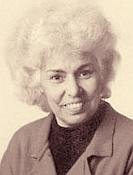 In 2003, the Egyptian author Dr. Nawal Al-Sa’dawi, known for her fervent Arab nationalism and feminism, called for amending the Egyptian constitution and eliminating the article that declares Islam to be the official state religion, ‘because we have among us Copts [Egyptian Christians], and because religion is a matter between man and God and no one has the right to impose his faith, his God and his rituals on others.” She also said that she believes in a political and military struggle against the U.S. and Israel.
In 2003, the Egyptian author Dr. Nawal Al-Sa’dawi, known for her fervent Arab nationalism and feminism, called for amending the Egyptian constitution and eliminating the article that declares Islam to be the official state religion, ‘because we have among us Copts [Egyptian Christians], and because religion is a matter between man and God and no one has the right to impose his faith, his God and his rituals on others.” She also said that she believes in a political and military struggle against the U.S. and Israel.The reactions to Sa’dawi’s statements were mixed, but Dr. Abd Al-Mun’im Al-Berri, former head of The Front of Al-Azhar Clerics, explained that “we should ask her to repent within three days, but if she persists with these ideas, she should be punished according to what the Islamic Shari’a [religious law] determined for those who abandon Islam. The ruler, meaning the head of state or government, should carry out the punishment.” Sheikh Mustafa Al-Azhari explained that “the punishment for anyone who fights Allah and His Prophet is execution, crucifixion, the amputation of opposite limbs or banishment from earth.”
Daveed Gartenstein-Ross states that “Though official proceedings against those who reject Islam are fairly rare - in part, no doubt, because most keep their conversion a closely held secret - apostasy is punishable by death in Afghanistan, Comoros, Iran, Mauritania, Pakistan, Saudi Arabia, Sudan, and Yemen. It is also illegal in Jordan, Kuwait, Malaysia, the Maldives, Oman, and Qatar. (…) The greatest threat to apostates in the Muslim world derives not from the state, however, but from private individuals who take punishment into their own hands. In Bangladesh, for example, a native-born Muslim-turned-Christian evangelist was stabbed to death in the spring of 2003 while returning home from a film version of the Gospel of Luke. As another Bangladeshi apostate told the U.S. Newswire, ‘If a Muslim converts to Christianity, now he cannot live in this country. It is not safe. The fundamentalism is increasing more and more.’”
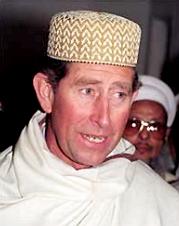 In Britain in 2004, Prince Charles brokered efforts to end the Muslim death penalty on converts to other faiths by holding a private summit of Christian and Muslim leaders. The Muslim group cautioned the prince and other non-Muslims against speaking publicly on the issue. A member of the Christian group said that he was “very, very unhappy” about the outcome. Patrick Sookhdeo, the international director of the Barnabas Fund which campaigns on behalf of persecuted Christians abroad, urged the prince and Muslim leaders in Britain to criticise openly the traditional Islamic law on apostasy, calling for it to be abolished throughout the world. According to Sookhdeo, “one of the fundamental notions of a secular society is the moral importance of freedom, of individual choice. But in Islam, choice is not allowable: there cannot be free choice about whether to choose or reject any of the fundamental aspects of the religion, because they are all divinely ordained. God has laid down the law, and man must obey.”
In Britain in 2004, Prince Charles brokered efforts to end the Muslim death penalty on converts to other faiths by holding a private summit of Christian and Muslim leaders. The Muslim group cautioned the prince and other non-Muslims against speaking publicly on the issue. A member of the Christian group said that he was “very, very unhappy” about the outcome. Patrick Sookhdeo, the international director of the Barnabas Fund which campaigns on behalf of persecuted Christians abroad, urged the prince and Muslim leaders in Britain to criticise openly the traditional Islamic law on apostasy, calling for it to be abolished throughout the world. According to Sookhdeo, “one of the fundamental notions of a secular society is the moral importance of freedom, of individual choice. But in Islam, choice is not allowable: there cannot be free choice about whether to choose or reject any of the fundamental aspects of the religion, because they are all divinely ordained. God has laid down the law, and man must obey.”In the London Times, Anthony Browne wrote about Mr Hussein, a 39-year-old hospital nurse in Bradford, one of a growing number of former Muslims in the West who face not just being shunned by family and community, but attacked, kidnapped, and in some cases killed. One estimate suggests that as many as 15 per cent of Muslims in Western societies have lost their faith. Mr Hussein told “It’s been absolutely appalling. This is England - where I was born and raised. You would never imagine Christians would suffer in such a way.” The police have not charged anyone, but told him to leave the area.
Anwar Sheikh, a former mosque teacher from Pakistan, became an atheist after coming to Britain, and lived with a special alarm in his house in Cardiff after criticizing Islam in a series of hardline books. “I’ve had 18 fatwas against me. They telephone me - they aren’t foolhardy enough to put it in writing. I had a call a couple of weeks ago. They mean repent or be hanged,” he said. “What I have written, I believe and I will not take it back. I will suffer the consequences. If that is the price, I will pay it.” Anwar Sheikh died peacefully in his home in Wales in November 2006.
Aluma Dankowitz, director of the Middle East Media Research Institute (MEMRI) Reform Project, writes about how the accusation against Muslims - particularly intellectuals, artists, and writers - of “unbelief” (an accusation known as “takfir”) recurs in the Muslim world. The traditional punishment for an apostate (murtadd) is capital punishment, which was implemented on a large scale in the period following the death of the Prophet Muhammad, when Muhammad’s successor Abu Bakr fought the ridda wars against the tribes that abandoned Islam.
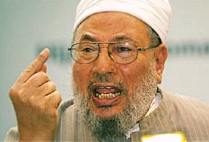 Sheikh Yousef Al-Qaradhawi, one of the most prominent clerics in Sunni Islam today, draws a distinction between two types of apostasy (ridda): “Limited ridda is the ridda of the individual who switches religion and is not interested in others. According to Islam, the punishment for this individual is [Hell] in the world to come. But [the other] ridda, which expands [from the individual to the group], is a ridda in which the individual who abandons Islam calls [upon others] to do likewise, [thus creating] a group whose path is not the path of society and whose goal is not the goal of the [Muslim] nation, and whose allegiance is not to the Islamic nation. Such [individuals] endanger the social fabric, and they are like the murtaddoon [apostates], who were fought by [the first Caliph] Abu Bakr together with the Companions of the Prophet.”
Sheikh Yousef Al-Qaradhawi, one of the most prominent clerics in Sunni Islam today, draws a distinction between two types of apostasy (ridda): “Limited ridda is the ridda of the individual who switches religion and is not interested in others. According to Islam, the punishment for this individual is [Hell] in the world to come. But [the other] ridda, which expands [from the individual to the group], is a ridda in which the individual who abandons Islam calls [upon others] to do likewise, [thus creating] a group whose path is not the path of society and whose goal is not the goal of the [Muslim] nation, and whose allegiance is not to the Islamic nation. Such [individuals] endanger the social fabric, and they are like the murtaddoon [apostates], who were fought by [the first Caliph] Abu Bakr together with the Companions of the Prophet.”In other words, those who publicly leave Islam constitute a threat to the morale of the Islamic community, just like soldiers defecting from an army, and must thus be punished before a mass-defection sets in. Al-Qaradhawi agrees with the traditional treatment of Muslims who leave their religion: “For Muslim society to preserve its existence, it must struggle against ridda from every source and in all forms, and it must not let it spread like wildfire in a field of thorns. Thus, the Muslim sages agreed that the punishment for the murtadd [who commits ridda] is execution.”
There is enormous social pressure in Muslim countries against expressing any kind of doubts about the Islamic religion. Razi Azmi, one of the more sensible columnists of Pakistan’s Daily Times Online newspaper, has mentioned the issue in an op-ed:
“For a moment, let us imagine a reverse scenario, a Muslim converting, say, to Christianity or, Heaven forbid, Hinduism or Buddhism, in a Muslim country. It defies imagination. There is unanimity among clerics from the various Islamic schools of thought that the penalty for an apostate (murtid) is death, the only disagreement being whether the execution should occur instantly or after the murtid has been given an opportunity to recant and return to the fold of Islam. So sure is the punishment and so strong the attendant social and family pressures that it is unthinkable for Muslims ever to openly question any aspect of their religion, let alone convert to another or to practice agnosticism or atheism.”
Islam’s hostility towards freedom of speech does not apply only to Muslims, but to anybody saying anything remotely critical of Islam, including non-Muslims. Muslims are already busy trying to shut down freedom of speech in Western nations through legal harassment and, increasingly, physical intimidation.
 Mohammed Bouyeri, born in Amsterdam of Moroccan Berber parents, murdered Dutch filmmaker Theo van Gogh, who had recently made a film critical of Islam together with the Dutch-Somali former Muslim Ayaan Hirsi Ali, on the morning of Nov. 2, 2004. As Mr. van Gogh cycled to work in Amsterdam, the bearded young man in a long Middle-Eastern-style shirt fired at him with a handgun, chased him, shot him once more, slit his throat from ear to ear and plunged two knives, one with a five-page letter attached, into the body. “I did what I did purely out my beliefs,” Bouyeri told judges while clutching a Koran, because he believed van Gogh insulted Islam.
Mohammed Bouyeri, born in Amsterdam of Moroccan Berber parents, murdered Dutch filmmaker Theo van Gogh, who had recently made a film critical of Islam together with the Dutch-Somali former Muslim Ayaan Hirsi Ali, on the morning of Nov. 2, 2004. As Mr. van Gogh cycled to work in Amsterdam, the bearded young man in a long Middle-Eastern-style shirt fired at him with a handgun, chased him, shot him once more, slit his throat from ear to ear and plunged two knives, one with a five-page letter attached, into the body. “I did what I did purely out my beliefs,” Bouyeri told judges while clutching a Koran, because he believed van Gogh insulted Islam.Orientalist Hans Jansen of Leiden University in The Netherlands has written an analysis of the letter which Mohammed Bouyeri left on the body of Theo van Gogh. As he points out, “MP Ayaan Hirsi Ali (or any other MP) is not eager to die for her membership of Parliament. Muslims such as Mohammed B. on the other hand are eager to shed their life for what they view as the good cause, which possibly gives Islam a tactical - strategic advantage in conflicts with others. That those who do not believe in heavenly compensation of martyrdom rather not become martyrs is a true statement and certainly relevant in Islam’s fight against the non-Muslims.”
A study from 2006 found that forty percent of the Moroccan youth in the Netherlands rejected Western values and democracy. Six to seven percent were prepared to use force to defend Islam. The majority were opposed to freedom of speech for offensive statements, particularly criticism of Islam. Similar numbers could no doubt be found among Muslims in other Western countries.
This kind of intimidation has taken its toll. In November 2006, publisher Scholastic Australia pulled the plug on the book the Army of the Pure after booksellers said they would not stock the adventure thriller for youngsters because the “baddie” was a Muslim terrorist. Because two characters were Arabic-speaking and the plot involves a mujaheddin extremist group, Scholastic’s decision was based “100 per cent (on) the Muslim issue.”
This decision was at odds with the publication of Richard Flanagan’s bestselling The Unknown Terrorist and Andrew McGahan’s Underground in which terrorists are portrayed as victims driven to extreme acts by the failings of the West. The Unknown Terrorist describes Jesus Christ as “history’s first ... suicide bomber.” In McGahan’s Underground, Muslims are executed or herded into ghettos in an Australia rendered unrecognisable by the war on terror.
The Syrian-born poet Ali Ahmad Sa’id, known by his pseudonym Adonis, says that “If the Arabs are so inept that they cannot be democratic by themselves, they can never be democratic through the intervention of others. If we want to be democratic, we must be so by ourselves.”
According to Adonis, the underlying structure of Arab societies is a structure of slavery, not of liberty: “Some human beings are afraid of freedom. When you are free, you have to face reality, the world in its entirety. You have to deal with the world’s problems, with everything. On the other hand, if we are slaves, we can be content and not have to deal with anything. Just as Allah solves all our problems, the dictator will solve all our problems.”
This is undoubtedly true, and this fear of freedom is not exclusive to Muslims. As philosopher Eric Hoffer writes in The True Believer:
“Freedom aggravates at least as much as it alleviates frustration. Freedom of choice places the whole blame of failure on the shoulders of the individual. And as freedom encourages a multiplicity of attempts, it unavoidably multiplies failure and frustration. (…) We join a mass movement to escape individual responsibility, or, in the words of the ardent young Nazi, ‘to be free from freedom.’ It was not sheer hypocrisy when the rank-and-file Nazis declared themselves not guilty of all the enormities they had committed. They considered themselves cheated and maligned when made to shoulder responsibility for obeying orders. Had they not joined the Nazi movement in order to be free from responsibility?”
According to Adonis, “The Muslims today - forgive me for saying this - with their accepted interpretation [of the religious text], are the first to destroy Islam, whereas those who criticize the Muslims - the non-believers, the infidels, as they call them - are the ones who perceive in Islam the vitality that could adapt it to life. These infidels serve Islam better than the believers.”
I’m not sure I agree with that. Although fear of freedom may be a universal human trait, it does seem to be more prevalent in Islamic societies than in others. Does this “slave mentality” that Mr. Adonis complains about partly originate from Islam itself?
Ibn Arabi (d. 1240), the “Greatest Sufi Master,” defined hurriyya, freedom, as “perfect slavery” to Allah. The mainstream Islamic website Islam Q & A defines the meaning of enslavement in Islam:
“If by ‘slave’ I mean al-’aabid, one who worships Allaah and obeys His commands, this meaning applies specifically to the believers to the exclusion of the kaafireen [infidels], because the believers are the true slaves of Allaah who attribute Lordship and Divinity to Him Alone and recognize Him by His Names and Attributes, and do not associate anything with Him. Enslavement to Allaah is an honour, not a cause of humiliation. We ask Allaah to make us among His righteous slaves.”
If Muslims are “slaves of Allah,” it is tempting to view ex-Muslims as runaway slaves, who are to be hunted down and punished for their desire for freedom, just as real slaves were in the old days.
Dr. Younus Shaikh, Pakistani Rationalist and the founder President of the Rationalist organization of Pakistan, was once sentenced for blasphemy, a crime that leads to a mandatory death sentence in Pakistan, for claiming that Muhammad did not become a Muslim until the age of 40 and received his first revelations in 610, and that his parents were non-Muslims because they died before Islam existed. He was later acquitted following international pressure, and now lives in exile in Switzerland.
According to Dr. Shaikh, “Islam is an organized crime against humanity!” Those may be harsh words, but it should be his right to say it. As Mr. Adonis states, “There can be no living culture in the world if you cannot criticize its foundations - the religion.” This means that Muslims must first accept criticism of their religion before they can have any hope of establishing free societies.
Freedom of speech is one of the most fundamental of all freedoms; it is necessary for a functioning democratic society. The Islamic world will never know true liberty until Muslim individuals may openly criticize their religion and even leave it without having to fear for their lives. This freedom must be established not just in Switzerland or the United States, but in Pakistan, Iran and Saudi Arabia. That vision of liberty so far remains a mirage in the distance.
Trying to prove that Islam is compatible with democracy, many Muslims are forced to twist existing Islamic concepts so that they cease to retain their original meaning. What remains can hardly be justified from a straight-forward reading of the Koran or the hadith.
Muhammad Al-Mukhtar Ash-Shinqiti, director of the Islamic Center in Texas, states: “Another important value is checks and balances by which powers are distributed and separated in a way that achieves independence of each power and the ability to check and correct each other. In Qur’anic terminology, this is called al-mudafa’ah, which is a very important Islamic concept that protects the society against corruption. Almighty Allah says, ‘Had not Allah checked one set of people by means of another, the earth would indeed be full of mischief.’” (The Koran, 2:251).”
But this idea of setting one group of people against another bears little relation to the Western concept of formal checks and balances as enshrined in the US Constitution. Protection against “corruption” in this context means excluding non-Islamic influences, not preventing the abuse of power.
Another such concept is shura, usually translated as “consultation,” which is found in the Koran 42:38, “...who (conduct) their affairs by mutual consultation...” and “… consult them in affairs (of moment)...,” 3:159. According to Ja’far Sheikh Idris, professor of Islamic studies in Washington, “broadly understood, democracy is almost identical with Shura.”
However, shura has never been formalized. The most authoritarian and brutal of rulers, such as Stalin or Mao, probably “consulted” somebody every now and then. Even Genghis Khan “consulted” someone as he massacred half of Asia. Thus, “consultation” by itself is meaningless. As long as there are not formal constraints on the ruler forcing him to take the good of the people into account, and as long as real sanctions are not in place if he fails to do so, “consultation” is empty rhetoric.
 Sunni Muslims talk about the four Rightly Guided Caliphs, Abu Bakr, Umar ibn al-Khattab, Uthman ibn Affan and Ali ibn Abi Talib, all of whom had known Muhammad personally. Their rule ended with the murder of Ali in 661. Then the nominal leadership of Islam was transferred from Medina to the Umayyid dynasty in Damascus. In 750 the Abbasid dynasty in Baghdad assumed the Caliphate, where it endured until 1258, when the Mongols sacked Baghdad. The Caliphate as a concept still persisted for centuries, although the Caliphs usually possessed no practical power. Finally, even the concept itself was formally abolished in 1924 by the Turkish nationalist leader Mustafa Kemal Atatürk.
Sunni Muslims talk about the four Rightly Guided Caliphs, Abu Bakr, Umar ibn al-Khattab, Uthman ibn Affan and Ali ibn Abi Talib, all of whom had known Muhammad personally. Their rule ended with the murder of Ali in 661. Then the nominal leadership of Islam was transferred from Medina to the Umayyid dynasty in Damascus. In 750 the Abbasid dynasty in Baghdad assumed the Caliphate, where it endured until 1258, when the Mongols sacked Baghdad. The Caliphate as a concept still persisted for centuries, although the Caliphs usually possessed no practical power. Finally, even the concept itself was formally abolished in 1924 by the Turkish nationalist leader Mustafa Kemal Atatürk.In an essay in newspaper The Guardian, spokesman Osama Saeed from the Muslim Association of Britain advocated recreating the institution, claiming that a “restored caliphate is entirely compatible” with democratically accountable institutions:
“The vision of any kind of new caliphate, shared by Muslims worldwide, is a distant one. Right now, even talk of bringing down trade barriers and free flow of people across Muslim states seems radical. But it is a vision that is needed, and one that should actually be supported by the US and Britain if they are sincere about the development of the Muslim world. The revival of a strong Muslim civilisation would be for the betterment of the whole world.”
Irfan Husain countered Saeed’s essay in Pakistani newspaper Dawn. He pointed out some glaring omissions:
“For starters, who would decide on a suitable candidate? What does an Indonesian have in common with a Turk, apart from faith? The truth is that religion is only one aspect of an individual’s identity. Other equally important factors include language, ethnicity, socio-economic status, education, and a whole slew of layers that compose identity. To assume that just because somebody is born a Muslim, he will automatically obey a distant figure who calls himself the caliph is to ignore just how tenuous the authority of most of the past caliphs actually was.”
The Christian Science Monitor interviewed a group of followers of Hizb ut-Tahrir, the Party of Liberation, in Jordan. They say that a single Islamic state from Indonesia to Morocco will bring prosperity and let Muslims conquer the West. “Islam obliges Muslims to possess power so that they can intimidate - I would not say terrorize - the enemies of Islam,” says Abu Mohammed, a Hizb ut-Tahrir activist. “And if after all discussions and negotiations they still refuse, then the last resort will be a jihad to spread the spirit of Islam and the rule of Islam,” he says, smiling. “This is done in the interests of all people to get them out of darkness and into light.”
One of the speakers, Ashraf Doureihi, at a conference in Sydney, Australia, in January 2007, stressed the importance of establishing an Islamic state:
“It is important... [to move] collectively in the Muslim world to demand this change from such influential people in our lands, even if it means spilling onto the streets to create a revolution or staging a military coup,” he said. According to Hizb ut-Tahrir spokesman Wasim Durie, the conference would discuss ways of establishing an Islamic superstate. “As we were here today, what is at stake is not just the destiny of the Muslim world but indeed the whole of mankind,” he said. Despite open calls for civil war, the Australian Government refused to ban the group.
It is easy to dismiss these ideas as marginal, but, as Robert Spencer warns, even if there is no chance of establishing a worldwide caliphate, that doesn’t mean that these groups aren’t dangerous:
“As if the fact that the Soviet Union had no chance of making the world communist means that it wasn’t a threat as it attempted to do so. These learned heads seem to have no regard at all for the fact that as Al-Qaeda and other jihadist groups try to establish a worldwide caliphate, they are capable of causing immense, catastrophic havoc. The fact that their goals are unattainable doesn’t mean they can’t do anything at all.”
Author Abid Ullah Jan’s book, The End of Democracy, has become highly popular in Islamic circles. Jan quotes an 11th century Iraqi jurist, al-Mawardi - whose works on governance are considered classics in the field - regarding the duties of the Caliph (page 189):
“According to Al-Mawardi, the duties of the Khalifah are, that he should guard the religion of Islam and suppress the growth of heresy; that he should interpret Islamic law as Mujtahid and promulgate it; that he should keep armies on the frontiers in order to defend Islamic territories from aggression by an enemy; that he should champion the cause of Islam either by offering Islam to the non-Muslims of the adjoining countries or by waging war against them until they accept the status of protected people [dhimmis]; that he should execute and preserve justice; that he should implement a sound financial system; that he should appoint only competent ministers, governors, tax-collectors, judges and other State officials and fix their salaries from the State treasury; and lastly, that he should supervise all the departments of the State.”
Abid Ullah Jan also quotes the highly influential 20th century theologian Abul A’la Mawdudi, the founder of Jamaat-e-Islami in today’s Pakistan (page 132):
“The ‘Islamic State seeks to mould every aspect of life and activity in consonance with its moral norms and program of social reform. In such a State no one can regard any field of his affairs as personal and private.’ However, this concept does not make the Islamic State an authoritarian or fascist regime, because ‘despite its all-inclusiveness, it [Islamic State] is something vastly and basically different from the modern totalitarian and authoritarian states.’ Mawdudi further elaborates: ‘Individual liberty is not suppressed under it nor is there any trace of dictatorship in it. It presents the middle course and embodies the best that the human society has ever evolved.’”
According to Jan, “The reason why Muslims are not given a chance to sit peacefully, take time and set an Islamic State is that an Islamic State has the potential to show a real model of a just social order with all the features that the champions of democracy claim but can never present.”
One might argue that it also has to do with the fact that one stated objective of this Islamic superstate, as Jan himself points out, is to kill or subdue all non-Muslims around the world.
In addition, Jan says that there has never been a single approved method for appointing such a Caliph, which he interprets as leaving room for elections (page 191):
“Prophet Muhammad (PBUH) by not appointing his successor or suggesting any specific mode or laying down any framework for constituting or deposing such a successor, had acted in conformity with the Qur’an which is silent on this issue.”
However, it is precisely because Muhammad, despite his many wives, never produced a male heir, never appointed a successor, and failed to provide any mechanism for choosing one, that immediate fissures developed among the early Muslims. Some wanted leadership to follow the bloodline of Muhammad through his daughter Fatima’s marriage to Alī bin Abī Tālib, the father of Muhammad’s male grandchildren Hassan and Husayn. He later became known as the first Imam of the Shi’a Muslims.
Despite all the nice words of modern apologists, it is difficult to view the Caliphate as anything other than a divinely imposed dictatorship. The principle of separation of powers as described by Montesquieu is totally unknown, indeed would be considered heretical. While there may be some dissent regarding the issue, it has been commonly held by Islamic jurists that as long as the ruler does not reject the basic tenets of Islam, he must be obeyed, since even a tyrannical ruler is better than anarchy. Thus he is supposed to “consult” others in the affairs of the state, but he is also free to ignore their advice. One is struck by the primitive nature of Islamic governance.
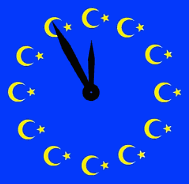 There will be debates by future historians about how EU leaders could do something as stupid as the creation of the Eurabian networks. One of the answers will have to be: They did it because they could.
There will be debates by future historians about how EU leaders could do something as stupid as the creation of the Eurabian networks. One of the answers will have to be: They did it because they could.I have heard some Socialists argue that the Communist system of the Soviet Union could have worked if they didn’t end up with a leader such as Stalin. This view is fundamentally flawed, for the system itself invited a Stalin, or a Mao; there were no formal restraints on the power of the rulers under Communism. The same principle holds true for the Caliphate. Lord Acton said, “Power tends to corrupt, and absolute power corrupts absolutely”. The Islamic set-up ensures corruption and the abuse of power.
In 2006, the European Commission (the EU’s government) announced that it would send its proposals for EU laws to national parliaments for comment - but it made clear that Brussels would only “take note” of national parliamentarians’ wishes. The European Union’s concept of “consultation” is thus that the people or their representatives should give their “advice,” and then the leaders should be free to ignore this advice. Thus the EU will be able to integrate seamlessly into the Caliphate, given that it already operates under some of the same principles.
The Middle East Media Research Institute (MEMRI) quotes Dr. Shaker Al-Nabulsi, a Jordanian intellectual, in criticizing Yusuf Al-Qaradawi’s claim that “democracy is in the essence of Islam.”
According to Nabulsi, “He is among those who maintain that the Shura is meant to advise the ruler, but does not obligate him. [Al-Qaradhawi holds that] the ruler must not be deposed even if he sins or oppresses, and that ‘the ruler must be obeyed even if he strikes you or expropriates your property.’ The Caliphate has remained unchanged from 632 through 2004 - it has kept its primitive, simple tribal form (the elite’s allegiance to the sovereigns) - an un-democratic structure, despotic, and bloody except for a brief period of 12 years during the rule of Abu Baker and Omar Bin Al-Khattab [the first and second Caliphs]. (...) Since the time of [the Umayyad Caliph] Mu’awiya Ibn Abi Sufyan through the last Ottoman Sultan, (that is from the year 661 through the year 1924), the Islamic Caliphate was drenched with blood, and ruled by fist and sword - and even today the situation is the same in most of the Arab world.”
Nabulsi quotes al-Qaradawi as saying: “‘There are those who maintain that democracy is the rule of the people, but we want the rule of Allah.’ Such ideas] are a call for the Rule of Allah, discussed by Sayyid Qutb in his book ‘The Milestones.’ [Qutb] borrowed this idea from Pakistani intellectual Abu Al-’Ala Al-Mawdudi, who introduced the theory that authority is Allah’s, not the people’s, and that the sovereign is none other than Allah’s secretary and His representative on earth.”
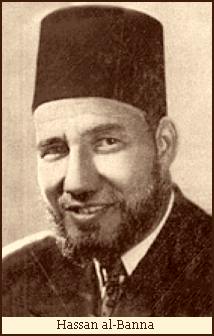 Hassan al-Banna founded the Muslim Brotherhood in 1928 with the stated goal of restoring the Caliphate. There are signs that his disciple Yusuf al-Qaradawi, now spiritual leader of the Brotherhood, hasn’t given up this goal. In an interview with German weekly magazine Der Spiegel, Qaradawi said: “Islam is a single nation, there is only one Islamic law and we all pray to a single God. Eventually such a nation will also become political reality. But whether that will be a federation of already existing states, a monarchy or an Islamic republic remains to be seen.”
Hassan al-Banna founded the Muslim Brotherhood in 1928 with the stated goal of restoring the Caliphate. There are signs that his disciple Yusuf al-Qaradawi, now spiritual leader of the Brotherhood, hasn’t given up this goal. In an interview with German weekly magazine Der Spiegel, Qaradawi said: “Islam is a single nation, there is only one Islamic law and we all pray to a single God. Eventually such a nation will also become political reality. But whether that will be a federation of already existing states, a monarchy or an Islamic republic remains to be seen.”In another essay, Al-Qaradawi states that: “Secularism may be accepted in a Christian society but it can never enjoy a general acceptance in an Islamic society. Christianity is devoid of a shari’ah or a comprehensive system of life to which its adherents should be committed.”
In contrast, according to The New Testament, the rule is to : “Render unto Caesar things which belong to Caesar, and render unto God things which belong to God” (Matthew 22:21).
But, “as Islam is a comprehensive system of worship (’ibadah) and legislation (Shari’ah), the acceptance of secularism means abandonment of Shari’ah,” and “the call for secularism among Muslims is atheism and a rejection of Islam. Its acceptance as a basis for rule in place of Shari’ah is downright riddah [apostasy].”
The adoption of secular laws and equality for Muslims and non-Muslims amounts to apostasy. Harsh words from a man who has voiced support for the traditional death penalty for apostates.
The Iranian intellectual Amir Taheri has noted, “There was no word in any of the Muslim languages for democracy until the 1890s. Even then the Greek word democracy entered Muslim languages with little change: democrasi in Persian, dimokraytiyah in Arabic, demokratio in Turkish. It is no accident that early Muslims translated numerous ancient Greek texts but never those related to political matters. The great Avicenna himself translated Aristotle’s Poetics. But there was no translation of Aristotle’s Politics in Persian until 1963.”
According to Taheri, one of the key stumbling blocks is equality: “The idea is unacceptable to Islam, for the non-believer cannot be the equal of the believer.”
“Democracy means the rule of the demos, the common people, or what is now known as popular or national sovereignty. In Islam, however, power belongs only to God: al-hukm l’illah. The man who exercises that power on earth is known as Khalifat al-Allah, the regent of God. But even then the Khalifah or Caliph cannot act as legislator. The law has already been spelled out and fixed for ever by God. (...) There is consultation in Islam. But the consultation thus recommended is about specifics only, never about the overall design of society.”
He sums up with the conclusion that “Islam is incompatible with democracy.” Yet in another essay, Amir Taheri wants Europeans to revive the Roman Empire:
“North Africa, which has the most beautiful beaches of the Mediterranean, could become a kind of Florida for the old-age pensioners of western and northern Europe. In exchange, millions of young people could move north from the south to provide the labor force needed to keep the modern European economies going. (...) A judicious mix of wealth and technology from the north and manpower from the south could turn the Euro-Mediterranean region into the biggest and most prosperous economy the world has ever seen.”
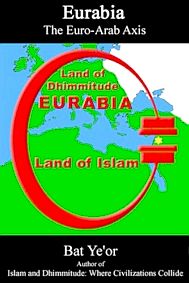 This idea is called “Eurabia” and is already being implemented, as Bat Ye’or can testify. And it wasn’t a very good idea. If he is correct that Islam is incompatible with democracy, what impact will it have on democracies if they get flooded with people who have an Islamic mentality? Amir Taheri is often brilliant in his writings about Islam, but in this case his ideas aren’t logically consistent.
This idea is called “Eurabia” and is already being implemented, as Bat Ye’or can testify. And it wasn’t a very good idea. If he is correct that Islam is incompatible with democracy, what impact will it have on democracies if they get flooded with people who have an Islamic mentality? Amir Taheri is often brilliant in his writings about Islam, but in this case his ideas aren’t logically consistent.According to the website Islam Online, “Islam is not a religion in the common, distorted meaning of the word, confining its scope only to the private life of man. By saying that it is a complete way of life, we mean that it caters for all the fields of human existence. In fact, Islam provides guidance for all walks of life - individual and social, material and moral, economic and political, legal and cultural, national and international.”
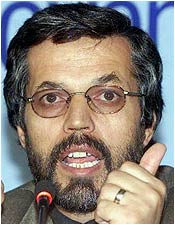 A common phrase is that Islam is Din wa Dawlah, religion and State. In 2005, after parliamentary elections, Younus Qanooni, a senior member of the Afghan Northern Alliance which helped the US overthrow the Taliban regime in 2001, stated that the country could never become a secular democracy. “Afghans will never agree on any secular or liberal system. Islam is the modern system and Afghanistan’s future is tied with Islam.” Yet Western soldiers are supposed to risk their lives, and Western taxpayers pay for, establishing just such a system.
A common phrase is that Islam is Din wa Dawlah, religion and State. In 2005, after parliamentary elections, Younus Qanooni, a senior member of the Afghan Northern Alliance which helped the US overthrow the Taliban regime in 2001, stated that the country could never become a secular democracy. “Afghans will never agree on any secular or liberal system. Islam is the modern system and Afghanistan’s future is tied with Islam.” Yet Western soldiers are supposed to risk their lives, and Western taxpayers pay for, establishing just such a system.This rather naïve view of democracy is unfortunately the rule rather than the exception. In a memo, the US State Department told its embassy in Cairo to launch a dialogue with religious groups because clashes with them would only incite more attacks against US interests. They also advised Washington to pressure the Egyptian government into allowing the Muslim Brotherhood to play a larger role in Egypt’s political landscape. This despite the fact that many of the worst terrorist groups today are offshoots of the MB. Dr. Ahmad Al-Rab’i, former Kuwaiti minister of education, warned that “The founders of the violent groups were raised on the Muslim Brotherhood, and those who worked with Bin Laden and Al-Qa’ida went out under the mantle of the Muslim Brotherhood.”
Author Tarek Heggy, too, warns that: “The Brotherhood opposes the notion of a state based on democratic institutions, calling instead for an Islamic government based on the Shura (consultative assembly) system, veneration of the leader and the investiture of a Supreme Guide. In this, they are close to the model established by the late Ayatollah Ruhollah Khomeini in Iran. (…) The Brotherhood calls for a constitutional and legal system based on the principles of Shari’a, including cruel corporal punishments in the penal code (stoning, lashing, cutting off the hands of thieves, etc.).”
Actually, the only place where there has been any movement toward a democratic Islam is in Denmark. Of all the Western nations,Denmark has mounted the strongest popular resistance against Islamization. Syrian-born MP Naser Khader has launched a network called Democratic Muslims. New members are required to sign a declaration that they oppose Sharia laws. “Freedom of speech is the breath of democracy - and if you take that away, then democracy dies,” said Khader.
Mr. Khader appears to be sincere about these efforts. So, apparently, are his Muslim opponents, which is why he has received numerous threats against his life. A French documentary used a hidden camera to capture an imam suggesting that Khader could attract suicide bombers if he became minister of integration affairs. The imam in question, Ahmed Akkari, later said he meant the comment as a joke.
The ideas behind the network are positive. They have defined the Ten Commandments of Democracy, among them:
| 1. | We must all separate politics and religion, and we must never place religion above the laws of democracy. | |
| 2. | We must all respect that all people have equal rights regardless of sex, ethnicity, sexual orientation or religious beliefs. | |
| 3. | No person must ever incite to hatred, and we must never allow hatred to enter our hearts. | |
| 4. | No person must ever use or encourage violence - no matter how frustrated or wronged we feel, or how just our cause. | |
| 5. | We must all show respect for the freedom of expression, also of those with whom we disagree the most. |
The problem is, only a small minority of the members Democratic Muslims are actually Muslims. The vast majority are non-Muslim supporters.
In addition, Muslims in Denmark seem far more interested in exploiting the democratic system than in supporting it. According to the Copenhagen Post, Wallait Khan was elected councillor for the Liberal Party in Copenhagen, only to defect to join the Socialist People’s Party, which allowed them to establish a left-wing coalition. But Khan had also been on the campaign trail in Pakistan. Khan said six people had been elected in Pakistan despite their Danish residencies. “We Pakistanis in Europe have a competition between ourselves,” he said. “We in Denmark compete with Pakistanis living in Norway and England about who holds most mayor posts.”
The European Council for Fatwa and Research, whose leader is Yusuf al-Qaradawi, are working on a Muslim Constitution for Europe that will be above national legislation. According to Tina Magaard from the University of Aarhus, behind these ambitions “lies decades of work.” Islamic groups have for years aimed at establishing their control of the Muslim immigrant communities, and in some cases have won official recognition from government bodies. According to Magaard, “The Imams and Islamists consider the cooperation with the state institutions a transfer of power. Now it is them who rule.”
Even without Islam, a pure democracy with no restraints would not always be a good thing. For example, one could win the support of a majority of the people, largely by promising them access to other people’s money. Once in power, one could begin to dissolve whatever restraints exist in order to secure permanent re-election. In February 2007, Venezuelan President Hugo Chavez was granted the right to rule by presidential decree in his efforts to build a Socialist state, a move critics say propels Venezuela toward dictatorship. National Assembly President Cilia Flores applauded with the words “Fatherland, socialism or death,” while hundreds of Chavez supporters outside waved signs reading “Socialism is democracy.”
Bruce Bawer, the author of the book While Europe Slept, noted that the title of world’s most democratic country was awarded to Sweden in 2006 by The Economist Intelligence Unit. According to Bawer, “For many observers, this is not only wrong - it’s staggeringly, outrageously misinformed. Though two-thirds of Swedes question whether Islam is compatible with Western society, this issue is simply not open for public discussion.” To quote observer Jonathan Friedman, “no debate about immigration policies is possible” because Sweden’s “political class,” which controls public debate, simply avoids the topic.
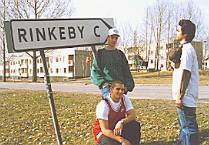 According to Bawer, the city of Stockholm “carried out a survey of ninth-grade boys in the predominantly Muslim suburb of Rinkeby. The survey showed that in the last year, 17% of the boys had forced someone to have sex, 31% had hurt someone so badly that the victim required medical care, and 24% had committed burglary or broken into a car. Sensational statistics - but in all of Sweden, they appear to have been published only in a daily newssheet that is distributed free on the subways. Sweden is the only major Western European country whose legislature contains not a single representative of a party critical of its immigration policies.”
According to Bawer, the city of Stockholm “carried out a survey of ninth-grade boys in the predominantly Muslim suburb of Rinkeby. The survey showed that in the last year, 17% of the boys had forced someone to have sex, 31% had hurt someone so badly that the victim required medical care, and 24% had committed burglary or broken into a car. Sensational statistics - but in all of Sweden, they appear to have been published only in a daily newssheet that is distributed free on the subways. Sweden is the only major Western European country whose legislature contains not a single representative of a party critical of its immigration policies.”Members of the small party, the Sweden Democrats, are critical of the country’s extremely open immigration policies. Seldom can they hold meetings without being hassled or physically attacked. This has happened regularly for years with the tacit approval of the Swedish elites. Swedish newspaper Expressen warned against the “low-intensity terrorism” conducted by extreme Leftists and neo-Nazis.
 Political scientist Peter Esaiasson has done research into every election movement in Sweden since 1866. According to him, the organized attempts at disrupting meetings during the 2006 elections have no parallels in modern history.
Political scientist Peter Esaiasson has done research into every election movement in Sweden since 1866. According to him, the organized attempts at disrupting meetings during the 2006 elections have no parallels in modern history.Added to this censorship on a national level, important decisions are made by unelected EU bureaucrats. If democracy is supposed to mean that citizens vote to decide their future, then Sweden is not a democracy; it is a multicultural dictatorship. One can vote for a variety of parties, but all of them support the same multiculturalism and mass immigration. Ordinary Swedes have little influence over their own future, and freedom of speech is non-existent. But the country still has the formal aspects of democracy: regular multiparty elections take place. This should remind us once again that elections do not automatically lead to a free society.
Famed historian Bernard Lewis, who reputedly had an important influence on the American policy to bring “democracy” to Iraq, in 2007 told The Jerusalem Post that Islam could soon be the dominant force in Europe. He ironically warned that this Islamization could be assisted by “immigration and democracy.”
In Vienna, Austria in December 2006, Santa Claus was removed from kindergartens. Municipal officials insisted that the sight of a strange bearded figure at the door would evoke fear in kids, but many observers accused them of kowtowing to a growing Muslim population.
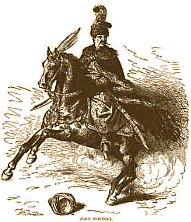 The Battle of Vienna in 1683, where the Ottoman Turks were beaten by a force led by King Jan III Sobieski of Poland, was the last time Muslims managed to threaten the West in traditional warfare. They gradually fell further and further behind due to their technological ineptness, which again is caused by their hostility towards freethinking as the basis of science. This suppression of curiosity is their Achilles’ heel. Perhaps they have finally found ours. This time they are already inside Vienna.
The Battle of Vienna in 1683, where the Ottoman Turks were beaten by a force led by King Jan III Sobieski of Poland, was the last time Muslims managed to threaten the West in traditional warfare. They gradually fell further and further behind due to their technological ineptness, which again is caused by their hostility towards freethinking as the basis of science. This suppression of curiosity is their Achilles’ heel. Perhaps they have finally found ours. This time they are already inside Vienna.In the end, Muslims have been more successful at peacefully infiltrating the democratic West than they ever were in challenging the pre-democratic West in open warfare.
Ibn Warraq warns that the Islamists view our open society as a means for infiltrating Western societies. He fears that we risk ending up with an Islamization of democracy instead of a democratization of Islam.
Walid al-Kubaisi, a Norwegian of Iraqi origins and a critic of sharia supporters, believes Yusuf al-Qaradawi is more dangerous than terrorist leader Osama bin Laden:
“In Europe, the Muslim Brotherhood discovered a unique opportunity: Democracy. The democratic system leaves room for freedom of religion and freedom of speech, and finances religious communities and religious organizations. This has been utilized by the Muslim Brotherhood to infiltrate the Muslim communities, recruit members and build the Islamist networks that have become so visible lately.” Whereas bin Laden uses bombs, al-Qaradawi exploits democracy as a Trojan horse. The Brotherhood gets their activities financed from Germany, England etc. They gain recognition and infiltrate the democratic system.
Patrick Poole describes the discussion of a document entitled “The Project”, which so far has been limited to the top-secret world of Western intelligence communities. It was only through the work of an intrepid Swiss journalist, Sylvain Besson, that information regarding The Project was finally been made public. It was found in a raid of a villa in Campione, Switzerland on November 7, 2001.
Included in the documents seized was a fourteen-page plan dated December 1, 1982, outlined a twelve-point strategy for a flexible, multi-phased, long-term approach to the “cultural invasion” of the West. Among the strategies recommended were the following:
- involving ideologically committed Muslims throughout institutions on all levels in the West;
- including government, NGOs, private organizations;
- utilizing existing Western institutions until they can be put into service of Islam; and
- instituting alliances with Western “progressive” organizations that share similar goals.
Sylvain Besson and Scott Burgess provide extensive comparisons between Qaradawi’s publication, Priorities of the Islamic Movement in the Coming Phase from 1990, and The Project. They note striking similarities between the two documents.
Meanwhile, Yusuf al-Qaradawi has been hailed as a “moderate” by people such as London’s mayor Ken Livingstone, who welcomed him to a conference in Britain. This despite the fact that Qaradawi has supported suicide bombers, brags about how Islam will conquer Europe and was the most important figure in whipping up hatred during the Danish Cartoon Jihad in 2006. The current official leader of the international Muslim Brotherhood, Mohammad Mahdi Akef, has declared that he has “complete faith that Islam will invade Europe and America.”
According to Dr. Rachel Ehrenfeld and Alyssa A. Lappen, the Brotherhood and its offspring organizations employ the Flexibility strategy:
“This strategy calls for a minority group of Muslims to use all ‘legal’ means to infiltrate majority-dominated, non-Muslim secular and religious institutions, starting with its universities. As a result, ‘Islamized’ Muslim and non-Muslim university graduates enter the nation’s workforce, including its government and civil service sectors, where they are poised to subvert law enforcement agencies, intelligence communities, military branches, foreign services, and financial institutions.”
Lorenzo Vidino writes about The Muslim Brotherhood’s Conquest of Europe: “Since the early 1960s, Muslim Brotherhood members and sympathizers have moved to Europe and slowly but steadily established a wide and well-organized network of mosques, charities, and Islamic organizations.” According to Vidino, “The ultimate irony is that Muslim Brotherhood founder Hassan al-Banna dreamed of spreading Islamism throughout Egypt and the Muslim world. He would have never dreamed that his vision might also become a reality in Europe.”
Douglas Farah has noted the largely successful efforts by Islamic groups in the West to buy large amounts of real estate. “We do not have a plan. They do. History shows that those that plan, anticipate and have a coherent strategy usually win. We are not winning.”
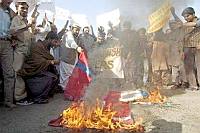 In early 2006, a tiny Norwegian Christian newspaper, Magazinet, had reprinted the Danish cartoons of Muhammad. After the spiritual leader of the Muslim Brotherhood, Yusuf al-Qaradawi, indirectly triggered attacks on the Norwegian and Danish embassies in Syria in February that year by whipping up anger in Arab television, Norway’s Minister of Labor and Social Inclusion Bjarne Håkon Hanssen called a press conference at a government office building in Oslo. There Velbjørn Selbekk, the editor of Magazinet, issued an abject apology for reprinting the cartoons. At his side, accepting his act of contrition and asking that all threats now be withdrawn, was Muhammad Hamdan, the then-head of Norway’s Islamic Council. As author Bruce Bawer wrote, it was exactly like a scene from a sharia court.
In early 2006, a tiny Norwegian Christian newspaper, Magazinet, had reprinted the Danish cartoons of Muhammad. After the spiritual leader of the Muslim Brotherhood, Yusuf al-Qaradawi, indirectly triggered attacks on the Norwegian and Danish embassies in Syria in February that year by whipping up anger in Arab television, Norway’s Minister of Labor and Social Inclusion Bjarne Håkon Hanssen called a press conference at a government office building in Oslo. There Velbjørn Selbekk, the editor of Magazinet, issued an abject apology for reprinting the cartoons. At his side, accepting his act of contrition and asking that all threats now be withdrawn, was Muhammad Hamdan, the then-head of Norway’s Islamic Council. As author Bruce Bawer wrote, it was exactly like a scene from a sharia court.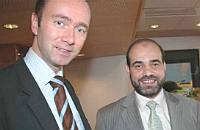 Trond Giske, Minister of Culture and Church Affairs, met with Mr. Muhammad Hamdan a few months later and announced that government subsidies for the Islamic Council would be raised from 60,000 kroner a year to half a million. That’s more than a 700% increase in a single year, and was undoubtedly viewed by Muslims as jizya. Thus it was in reality a formal recognition by Norwegian authorities that the country was now under Islamic rule.
Trond Giske, Minister of Culture and Church Affairs, met with Mr. Muhammad Hamdan a few months later and announced that government subsidies for the Islamic Council would be raised from 60,000 kroner a year to half a million. That’s more than a 700% increase in a single year, and was undoubtedly viewed by Muslims as jizya. Thus it was in reality a formal recognition by Norwegian authorities that the country was now under Islamic rule.Later in 2006, Minister Bjarne Håkon Hanssen from the Labor Party called for increased immigration to Norway from Pakistan because this would be “good for the economy.” The majority of Muslims in Norway voted for the Labor Party in 2005, and 83% for Leftist parties in general. Samira Munir, a member of the city council in the capital city of Oslo, warned that there was widespread cooperation between the Socialist parties and Muslim communities during that year’s elections. “The heads of families and the mosques would decide how entire groups of immigrants would vote. They made deals such as ‘How much money will we get if we get our people to vote for you?,’ and the deals were always made with the Socialist parties.”
Norway is an unusually naïve nation. While it may not be the best yardstick to measure Islamic infiltration, the challenges Norway faces can be found in many democratic countries, and not just Western ones.
Perhaps the greatest idea of the Leftist factions after the Cold War was to re-invent themselves as Multicultural parties and begin to import voters from abroad. There is nothing new about buying “clients” by promising them access to other people’s money. However, this defect becomes more dangerous when combined with massive immigration. In Europe, Muslim immigration may turn democracy into a self-defeating system that will eventually break down because native Europeans no longer believe that it serves their interests.
The Turkish government tried to influence the Dutch general elections in 2006 through e-mails sent to thousands of ethnic Turks in the Netherlands. According to Paul Belien of The Brussels Journal, “This has created a situation where the immigrants in Western democracies become Trojan horses of foreign nationalism and religious fanaticism.”
Indian Prime Minister Manmohan Singh, a Sikh, in 2007 stated that minorities, particularly Muslims, must have the first claim on resources so that the benefits of India’s economic development would reach them equitably. He failed to state that this was probably also for the electoral benefit of his own Congress Party, which has been courting Muslims in India since the time of Mahatma Gandhi and Nehru. Muslims are lagging behind non-Muslims in economic development everywhere, from Western Europe to Malaysia, which strongly indicates that their backwardness has something do with Islamic culture.
Muslims in India can partially follow sharia law, with official recognition. The All India Muslim Personal Law Board has gone to the High Court to lower the legal age of marriage, and insists that in family matters India’s Muslims should be subject only to sharia. In January 2007, the government informed the Supreme Court that Muslims under their personal law have a right to establish sharia courts to settle disputes between two people and that fatwas issued by these courts are not in conflict with the Indian justice system.
Scholar K.S. Lal analyzed Indian demography for the period between 1000-1525. Lal estimates that the numbers of Hindus who perished as a result of these campaigns was approximately 80 million.
According to historian N.S. Rajaram, “India, where the wounds inflicted by centuries of Islamic rule on a large segment of the Indian intelligentsia and the political class have been so debilitating that they continue to live in a state of constant fear. (...) Political freedom in India has not brought about spiritual freedom; politicians and the intelligentsia still act like oppressed colonial subjects when asked to face the truth about their country’s Islamic past.”
In Foreign Affairs magazine, F. Gregory Gause III, Associate Professor of Political Science at the University of Vermont claims that there is no evidence that democracy reduces terrorism, and points out the number of terrorist incidents in India:
“It is fair to assume that groups based in Pakistan carried out a number of those attacks, particularly in Kashmir, but clearly not all the perpetrators were foreigners. A significant number of terrorist events in India took place far from Kashmir, reflecting other local grievances against the central government.”
Despite the fact that Muslims have massacred tens of millions of non-Muslims in India for more than one thousand years, Muslims in the Republic of India don’t merely have equal rights with non-Muslims, they have special rights and can follow sharia for family matters in what is supposedly a secular country. India was also one of the first countries to ban Salman Rushdie’s book The Satanic Verses after the Ayatollah Khomeini issued his death sentence in 1989, thus restricting the freedom of speech for almost one billion non-Muslims out of fear of Muslim violence.
Former Prime Minister of Thailand Thaksin Shinawatra was controversial for several reasons, but there is no doubt that his clash with the Islamic Jihad in Thailand’s south greatly contributed to his removal through a military coup in 2006. Most of Thailand’s inhabitants are Buddhists, but the southern provinces close to Malaysia have Muslim majorities, where a Muslim insurgency has prompted many Buddhists to flee their homes. Monks have been beheaded and teachers slain. Almost one thousand public schools have been closed in the south due to a wave of arson attacks against schools and the murders of dozens of teachers.
A leaflet which was distributed in the region stated that “This land must be liberated and ruled by Islamic Law. This land does not belong to Thailand, this is a land of war that is no different from Palestine and Afghanistan ... Muslims and non-believers have to live separately.”
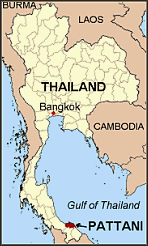 Chulanont Surayud, Thai military officer, interim Prime Minister and head of a military junta that had overthrown the elected government in the fall of 2006, publicly apologized for the former government’s hard-line policies and said that he would urge the limited use of Islamic law in the south, especially over family affairs.
Chulanont Surayud, Thai military officer, interim Prime Minister and head of a military junta that had overthrown the elected government in the fall of 2006, publicly apologized for the former government’s hard-line policies and said that he would urge the limited use of Islamic law in the south, especially over family affairs.Judging from the experiences of India, there is little reason to believe that granting limited sharia to Muslims would end violence against non-Muslims. Most likely, the Buddhists of southern Thailand will end up being refugees in their own country, just like the Hindus of Kashmir, while their government appeases Muslims with sharia.
Certain observers mistakenly claim that “once Muslims become a majority, we will get sharia through elections.” On the contrary, sharia will arrive much sooner. Observe that relatively small percentages of Muslims can squeeze concessions out of democracies. Sharia has already been partially implemented in India, Thailand, the Philippines, and Britain. Islam’s inherent aggressiveness elicits appeasement from non-Muslims in order to avoid bringing down the democratic system through civil war.
In Policy Review, Lee Harris reviews Andrew G. Bostom’s excellent book The Legacy of Jihad. Harris warns against those who dismiss the idea that Jihad constitutes a serious Islamic threat to the West because we are technologically superior to the Islamic world:
“The jihadists are not interested in winning in our sense of the word. They can succeed simply by making the present world order unworkable, by creating conditions in which politics-as-usual is no longer an option, forcing upon the West the option either of giving in to their demands or descending into anarchy and chaos. It is tempting to call this approach the crash of civilization.”
Accordingly, says Harris, “In the crash-of-civilization paradigm - contrary to Clausewitzian warfare - the enemy of a particular established order does not need to match it in organizational strength and effectiveness. It needs only to make the established order reluctant to use its great strength out of the understandable fear that by plunging into civil war it will itself be jeopardized. This fear of anarchy - the ultimate fear for those who embrace the politics of reason - can be used to paralyze the political process to the point at which the established order is helpless to control events through normal political channels and power is no longer in the hands of the establishment but lies perilously in the streets.”
 In September 2006, French high-school philosophy teacher Robert Redeker published an op-ed article stating that unlike Christianity and Judaism, “Islam is a religion that, in its own sacred text, as well as in its everyday rites, exalts violence and hatred.” For the crime of stating that Islam was violent, Redeker received numerous death threats and had to go into hiding with his family and give up his teaching profession.
In September 2006, French high-school philosophy teacher Robert Redeker published an op-ed article stating that unlike Christianity and Judaism, “Islam is a religion that, in its own sacred text, as well as in its everyday rites, exalts violence and hatred.” For the crime of stating that Islam was violent, Redeker received numerous death threats and had to go into hiding with his family and give up his teaching profession.According to writer Christian Delacampagne, “large sectors of the French intellectual and political establishment have carved out an exception to this hard-won tradition of open discussion: when it comes to Islam (as opposed to Christianity or Judaism), freedom of speech must respect definite limits.”
Seyran Ates, who for a generation had endured threats from Turkish men in Germany, including being shot and badly wounded, as she represented the wives who accused them of abuse, had to give up her Berlin law practice because it had become too dangerous. Italian conservative MP Daniela Santanche has received death threats over her opposition to the Islamic veil. In Spain, author Gustavo de Arístegui, Foreign Affairs Spokesman for Spain’s conservative Partido Popular, has received police protection after being branded an enemy of Islam.
With Muslim immigration, a culture of threats, legal and social harassment as well as physical intimidation is gradually spreading in non-Muslim countries. What Muslims cannot yet achieve by the sword, they will try to achieve by lawyers backed by Arab oil money. The fear of an expensive court battle is an effective weapon that can be used to silence critics of Islam.
In Canada, Mark Harding was sentenced to 340 hours of community service - that is, indoctrination - under the direction of Mohammad Ashraf, general secretary of the Islamic Society of North America in Mississauga, Ontario. Judge Sidney B. Linden’s 1998 decision was based on Canada’s hate-crimes law. The judge determined Harding was guilty of “false allegations about the adherents of Islam calculated to arouse fear and hatred of them in all non-Muslim people.”
Harding’s crime was to distribute pamphlets outside a public high school. His materials listed atrocities committed by Muslims in foreign lands. The pamphlet said: “The Muslims who commit these crimes are no different than the Muslim believers living here” and that “Toronto is definitely on their hit list.”
In 2006, Canadian police arrested a group of Muslim men suspected of planning terror attacks against various targets including the Toronto subway. An intelligence study warned that a “high percentage” of Canadian Muslims involved in extremist activities were born in Canada.
Harding’s case demonstrates that it is now a criminal act in several Western nations to tell the truth about the dangers posed by Muslim immigration. Hate speech laws amount to “sharia lite”: they are used to silence infidels such as Harding for criticizing Islam, which again corresponds to the workings of sharia. The sharia lite of political correctness is thus paving the way for the gradual implementation of full sharia in the West.
Hate crime legislation, too, is legalized political correctness and constitutes a radical departure from the ideal of equality before the law. You will be punished differently for assaulting a black Muslim than for the same crime against a white Christian, a Hindu woman or a Jewish man etc. Some would argue that this already happens in real life. However, the point here is that this de facto inequality has now become de jure. This formal change constitutes a gross perversion of justice. It mirrors Islamic law, which mandates different punishments for the same crime, depending upon the religious background and the sex of both the perpetrator and the victim.
Islam has always valued individual life inequitably. But now there is a creeping tendency within the West toward the same view. In the case of assault or murder, an additional sentence is added if the act is viewed as a “hate crime.”
Murder is murder, and all human life is to be valued equally. However, according to Multiculturalism we are required to treat all cultures and religions as equally valid, which they obviously are not. This perversion of reality indicates that the Western system of justice is regressing. As it does so, justice becomes vulnerable to exploitation and infiltration by Islamic law.
 Zachariah Anani, a former jihadist and a convert to Christianity, gave a lecture in Windsor, Ontario on “the dangers of radical extremism.” Muslim interest groups, including CAIR (Council on American-Islamic Relations) Canada, charged him with “spreading hatred in the community.” Former Muslim Walid Shoebat believes that silencing Anani is a dangerous trend with far-reaching implications for the future of Canadian and eventually US freedoms.
Zachariah Anani, a former jihadist and a convert to Christianity, gave a lecture in Windsor, Ontario on “the dangers of radical extremism.” Muslim interest groups, including CAIR (Council on American-Islamic Relations) Canada, charged him with “spreading hatred in the community.” Former Muslim Walid Shoebat believes that silencing Anani is a dangerous trend with far-reaching implications for the future of Canadian and eventually US freedoms.According to the American writer and scholar Daniel Pipes, Omar Ahmad, the long-serving chairman of CAIR, told a crowd of California Muslims in July 1998, “Islam isn’t in America to be equal to any other faith, but to become dominant. The Koran ... should be the highest authority in America, and Islam the only accepted religion on earth.”
Pipes claims that CAIR has mastered the victimization game and is “perpetually on the prowl for any incidence of anti-Muslim sentiment, real or imaginary, spontaneous or provoked, major or minor.” The organization’s goal, Pipes says, is “to make the United States like so many other countries - a place where Muslims, Islam and Islamism cannot be freely discussed.”
CAIR receives significant financial aid in its efforts. In 2006, wealthy Saudis such as Prince Alwaleed ibn Talal donated at least $50 million to CAIR. Much of this money was to be spent on a media campaign over the next five years in the United States. CAIR and other Islamic organizations have had significant success in achieving acceptance of the concept of “Islamophobia”. It has met with representatives of federal institutions, including the FBI, to address this issue.
What exactly is democracy? Karl Popper has said that “I personally call the type of government which can be removed without violence ‘democracy,’ and the other, ‘tyranny.’” Ludwig von Mises held similar views, stating that “The essence of democracy is not that everyone makes and administers laws but that lawgivers and rulers should be dependent on the people’s will in such a way that they may be peaceably changed if conflict occurs.”
Historically, direct democracies have almost always been relatively small communities, such as the Greek city-states where the word “democracy” itself was coined in the 5th century BC. The most famous was the ancient Athenian democracy, where voting rights were gradually expanded to all citizens, which still meant a minority of the population of the city.
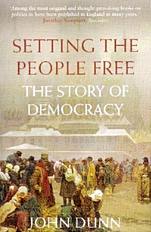 The scholar John Dunn tracks this development in his book Setting the People Free: The Story of Democracy, a title he chose in order to convey a degree of irony. According to Dunn, “Under democracy the citizens of Athens, quite reasonably and accurately, supposed that they were ruling themselves. But the vastly less exclusive citizen bodies of modern democracies very obviously do nothing of the kind. Instead, they select from a menu, which they can do little individually to modify, whichever they find least dismaying amongst the options on offer.”
The scholar John Dunn tracks this development in his book Setting the People Free: The Story of Democracy, a title he chose in order to convey a degree of irony. According to Dunn, “Under democracy the citizens of Athens, quite reasonably and accurately, supposed that they were ruling themselves. But the vastly less exclusive citizen bodies of modern democracies very obviously do nothing of the kind. Instead, they select from a menu, which they can do little individually to modify, whichever they find least dismaying amongst the options on offer.”Whereas Plato loathed democracy, Aristotle was critical but more sober. He envisioned a government by the many, which was nevertheless a good system:
Page 47: “Aristotle himself chose to call it not democracy but politeia, (polity or, more informatively, constitutional government). Politeia was distinguished from democracy not merely by a difference in purpose and disposition (a commitment to collective good rather than group advantage), but also by a different and more elaborate institutional structure.”
James Madison, the chief drafter of the Bill of Rights, contributed a great deal to drafting of the US Constitution and set-up of its government, in discussion with among others his friend Thomas Jefferson. They were both critical of the idea of pure democracy. Thomas Jefferson warned against “elective despotism.” They desired what Alexander Hamilton had called a representative democracy, or indirect democracy. Dunn is not convinced this arrangement can properly be called democracy, in the meaning of direct citizen involvement in decisions which it had in ancient Greece.
Page 79: “Whatever else the new American state might or might not be called, it could not properly be termed a democracy. A representative government differed decisively from a democracy not in the fundamental structure of authority which underlay it, but in the institutional mechanisms which directed its course and helped to keep it in being over time.”
John Dunn thinks US President Bush’s idea that the expansion of democracy to Iraq and the Middle East should roll back terrorism was “a glaring instance of ideological overstretch.”
Maybe the word “democracy” is now so diluted that it has become almost meaningless. Since the word itself is vague but at the same time too established to ignore, perhaps we can distinguish between pure democracy, which isn’t always a good system even without Islam, and restrained democracy, with a balance between short-term populism and long-term interests.
In The Case for Sovereignty, Jeremy A. Rabkin describes how Jürgen Habermas, Germany’s most celebrated philosopher, talks about establishing a structure of international law and authority that will control and direct all governments.
As Rabkin timely asks: “Who could challenge or constrain a world authority with such immense power? Even if it were constrained by a formal constitution, who could possibly ensure that the world authority remained within its proper bounds? How could it be anything like a democracy? Would a hundred small nations outvote the half-dozen largest nations? Or would a billion Chinese, a billion Indians, and a half-billion Southeast Asians be allowed to form a permanent majority, dictating law and justice to the rest of the world?”
There was no United Nations or international law in the late 18th century. Rabkin thinks the US Founding Fathers “would have been appalled at the thought that the federal government, in turn, would be subordinate to some supranational or international entity, which could claim priority in this way over the American Constitution and American laws.”
The combination of 21st century mass media, transnational legislation, and bureaucratic feudalism helped transform Europe into Eurabia. Thousands of pages of legislation continue to be passed without the knowledge or consent of European citizens. Through mass immigration the demographic profile of the continent is now rapidly changing, frequently without public consent.
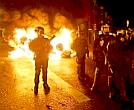 The Jihad riots in France in 2005 demonstrated that hundreds of ghettos were under de facto Islamic control. French state control ceased to function in these areas; thus the state’s monopoly of violence has been broken. The rule of law in much of Europe is now being seriously eroded. People see that the national taxes they pay go to governments that can no longer control their own borders, uphold their own laws, or even provide the most basic security for its citizenry.
The Jihad riots in France in 2005 demonstrated that hundreds of ghettos were under de facto Islamic control. French state control ceased to function in these areas; thus the state’s monopoly of violence has been broken. The rule of law in much of Europe is now being seriously eroded. People see that the national taxes they pay go to governments that can no longer control their own borders, uphold their own laws, or even provide the most basic security for its citizenry.Either the conditions needed for a functioning democratic system will be restored, or the system will collapse. An increasing number of observers fear that we have already passed the point where the tensions can be contained within the structure of a democratic system, and will give rise to civil wars.
The Racial and Religious Hatred Bill in Britain from 2005 is a textbook illustration of the potential flaws of a democracy in meeting with Islam. Minorities can wield disproportionate influence in a democratic system if they can tip the scales in favor of a particular party or alliance. In this case, the Labour Party was using the freedom of speech of their citizens as a bargaining chip to woo Muslim voters.
The powers of the House of Lords, the unelected upper chamber of the British Parliament, have steadily declined since the 19th century. However, they can still delay bills from the House of Commons. A watered down version of the Racial and Religious Hatred Bill was finally passed, following opposition by the Lords. Notice here that it was the “anachronistic” House of Lords - the least democratic element of the British Parliament - which proved to be most sensible in this case.
The US Founding Fathers feared “mob rule” and tried to insulate the elected representatives of Congress from what they perceived as the fickleness of the general populace. I understand this viewpoint. We should be less religious about what is or is not democracy. Democracy should never be a goal in itself, nor should all legislation be passed according to the whim of the majority at a given moment. The ideal is a balanced and well-functioning system.
However, it isn’t always the case that ordinary citizens are stupid and their leaders wise. It was after all the political elites in Europe who created Eurabia, not the general populace. The US Founding Fathers in the 18th century did not fully foresee the possibility that the elected representatives could deliberately choose not to uphold their country’s borders, as they are doing in the United States vis-à-vis Mexico in the 21st century.
A century or two ago, the interests of the national political elites largely coincided with those of the nation state as a whole. This is no longer automatically the case in our globalized society. Many politicians and senior bureaucrats feel little emotional attachment to their own nations. Often they are more interested in courting the transnational organizations and multinational corporations, since these entities will provide them with the most lucrative job opportunities.
This situation is an important factor behind the growing erosion of trust between the rulers and the ruled in many Western nations. A common - and often quite accurate - theme among ordinary citizens is a sense of having been abandoned by the “political elites.” In the 21st century, one of the greatest challenges for a functioning democratic system will not merely be to keep the fickleness of the “common people” in line. Even more important, it will be necessary to force the sometimes reluctant elected representatives to uphold their country’s borders and to take into account the wishes of the electorate for national sovereignty. This balance may not be easy to achieve.
The Chinese blogger Ohmyrus (who also writes very sensible articles about Islam) on his blog “Reforming Democracy” refers to politicians as “votepreneurs” and points out that democracy has several flaws: “There are, simply put, more poor people than rich people. What this means is that politicians can prosper at the ballot box by proposing redistributive policies. The result is high taxes.”
 According to Thomas Jefferson, “The democracy will cease to exist when you take away from those who are willing to work and give to those who would not.” Quotes like this indicate, according to Ohmyrus, that the US Founding Fathers were concerned more with liberty than with democracy.
According to Thomas Jefferson, “The democracy will cease to exist when you take away from those who are willing to work and give to those who would not.” Quotes like this indicate, according to Ohmyrus, that the US Founding Fathers were concerned more with liberty than with democracy.Ohmyrus also believes that democracies produce short-term thinking, and “are incapable of delivering short term pain for long term gain. They tend to do the opposite, ie, deliver short term gain at the expense of long term pain. (...) I think the monarchies of the 19th century Europe were better macroeconomic managers than the democratically elected politicians of the 20th century. Statistics show that interest rates, taxes and inflation were on the whole lower. So was government debt as a share of the GDP.”
He believes this happened because monarchs and nobles tended to think more about the long term. At the same time they did not have absolute power, and so had to take the will of the general public into consideration. Our current problem lies not so much with the votepreneurers (politicians), but with the system under which they labor.
He proposes several remedies this situation. Among other things, the US President’s time in office could be increased to a single term of eight years, while the time in office for other elected officials would also lengthen and similarly be fixed for a single term.
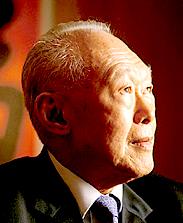 According to Singapore’s long-time leader Lee Kuan Yew, it is demography, not democracy, that will be the critical factor in shaping growth and security in the 21st century. Although I do not always agree with him, it is true that any political system, democratic or non-democratic, cannot long survive the loss of its territorial integrity without also losing control over its own demographic future. Yet this is exactly the current reality in many democratic nations.
According to Singapore’s long-time leader Lee Kuan Yew, it is demography, not democracy, that will be the critical factor in shaping growth and security in the 21st century. Although I do not always agree with him, it is true that any political system, democratic or non-democratic, cannot long survive the loss of its territorial integrity without also losing control over its own demographic future. Yet this is exactly the current reality in many democratic nations.Just as the planet is in the midst of an unprecedented population boom, and technological advances have combined to produce the largest and fastest migration waves in the history of mankind, many democratic nations have become so bogged down by idealistic human rights legislation and naive open border ideologies that they have now lost control over their own borders. Again, this cannot continue for long without serious consequences.
In January 2007, a poll conducted in Britain showed that 82% of the public disagreed with the claim that the Government was in control of immigration, and almost as many believed the authorities were not honest about immigration. Sir Andrew Green, chairman of the think-tank Migrationwatch, said this reflected “a deep underlying resentment among the public that they have not had any opportunity to express their views - still less to be consulted - on a matter of major importance to them and to the future of our country.”
This represents a dangerous crisis of legitimacy. It is especially serious when it comes as authorities are increasing restrictions on free speech. This combination could well result in a popular explosion further down the road. As US President John F. Kennedy once said, “Those who make peaceful revolution impossible will make violent revolution inevitable.”
The blogger Ohmyrus fears this outcome, too: “While it took a long time for Europeans to learn to settle their differences peacefully through the ballot box, this important lesson is slowly being unlearned. The lesson learned from the Danish cartoon affair is that violence pays. Most western governments caved in by issuing apologies or condemning the cartoons instead of defending free speech. Soon groups that oppose immigration will turn to violence too. If European democracies cannot manage their ethnic tensions, democracy will break down, ushering in dictatorial rule.”
To sum up my findings, I am not totally uncritical of the democratic system, nor do I believe that it automatically translates into individual liberty. Democratic nations may have to undergo significant changes if the system of democracy to survive this century. The goals should be:
- a balanced and well-functioning system, which requires free speech;
- real restraints upon the power of the ruler, and
- equality before the law.
None of these are compatible with Islamic sharia.
 Muslims aren’t necessarily afraid of voting. Note that the terrorist organization Hamas gained power through Palestinian elections. According to historian Niall Ferguson, a Gallup poll published in 2007, which surveyed 10,000 Muslims in 10 different countries, revealed that radical Muslims were more supportive of democracy than moderate ones: “The richer these people get, the more they favour radical Islamism. And they see democracy as a way of putting the radicals into power.”
Muslims aren’t necessarily afraid of voting. Note that the terrorist organization Hamas gained power through Palestinian elections. According to historian Niall Ferguson, a Gallup poll published in 2007, which surveyed 10,000 Muslims in 10 different countries, revealed that radical Muslims were more supportive of democracy than moderate ones: “The richer these people get, the more they favour radical Islamism. And they see democracy as a way of putting the radicals into power.”What Muslims are afraid of is freedom of speech. The want to intimidate the critics of Islam into silence, while they continue demographic conquest through immigration and high birth rates. They have enjoyed considerable success with this strategy. Our present system of democracy rewards those with high birth rates, which, for the present, means Muslims.
A democracy cannot be established in a genuinely Islamic country, at least not if “democracy” means anything more than the mere act of voting, with no restraints on state power and no safeguards for minorities. This is simply an advanced form of mob rule. If the meaning of “democracy” expands to include constitutional government, secular jurisprudence, the rule of law and equality before the law, and above all freedom of speech, then no - constitutional democracy cannot be reconciled with Islam. It is a waste of time and money to make the attempt.
Non-Muslims currently have the wrong focus. Trying to export democracy to Islamic countries such as Iraq is futile. As American blogger Lawrence Auster has pointed out, we should rather be protecting our own democracies at home against Islam. Writer Diana West has called for an anti-sharia defensive instead of a pro-democracy offensive as the preferred strategy in dealing with Muslims, which makes a lot of sense. Islam is utterly incompatible with human liberty in any meaningful sense of the word. However, Islam may be very well situated to exploit flaws in the democratic system and destroy it from within.
I have called for a global infidel strategy of containment of the Islamic world as far as possible, which includes banning Muslim immigration. This would eventually force Muslims to face up to the failures produced by their cultural system. Challenge your enemy where he is weak. Islam cannot tolerate freedom of speech, which is its greatest weakness. The United States is well-situated to make this challenge. It still has a relatively low number of Muslims and also retains strong legal protections of free speech. The greatest weapon Muslims fear in the American arsenal is the First Amendment. This rule, so wisely included in the Bill of Rights by the Founding Fathers, ensures individual freedom of speech against the tyranny of the majority.
If the United States wants to maintain what it sees as its moral leadership, it can begin by challenging Islamic censorship and intimidation. China doesn’t care, nor does Russia, while India has a huge Islamic fifth column to worry about. Europe is controlled by a Eurabian elite that is both unwilling and incapable of protecting free speech from Muslim intimidation, which is why many Europeans have become free speech refugees on American websites such as Robert Spencer’s Jihad Watch and Charles Johnson’s Little Green Footballs.
While formal protection of free speech is important, social and informal censorship are equally challenging. At the end of the day, we will also have to shed the straightjackets of Multiculturalism and Political Correctness if our democratic system is to survive Islamic challenges as well as other attacks on our freedoms.

Thanks to Yorkshire Miner for providing us with the “Eurabia Clock”.

14 comments:
Islam is "compatible" with "democracy" only in this sense:
"One man, one vote, one time."
Democracy requires a belief system.
It does not create one.
If the majority (demos) want Sharia Law, they can "democratically" choose it and thereby end human freedom.
In contrast, what we have in the West is a Constitutional system which will not allow "human rights" to be destroyed by any voting process.
Because these freedoms are not "given" by any Constitution or government, but are inborn. The state is organized to defend our nature-given freedom.
Islam has no such concept of "human liberty", being a creed that demands the unquestioning "submission" of all humanity to their anti-liberty dogmas and fealty to its specific brand of theocratic tyranny.
As one who subscribes to the belief in "natural human freedom", I am instinctively opposed to Islam.
And it to me.
Let the contest be fought openly.
What a totally amazing post, this is like a book. Great job! Secular Islam if there is such a thing is compatible with Democracy, but with real Islam it is not even 'Dhimmocracy'...
absurd thought -
God of the Universe thinks
plan jihad for longest term
outbreed the infidels
one day vote in sharia
.
Hey all of you, and thank you for a truly great meeting – it has taken me a little while to think it all through. I agree with Frøken Sverige, I think we have taken one little step down a road - with a destination difficult to fathom.
It will be an interesting voyage – and I hope, it will be at lot fun on the way.
Now when I have thrown away my cover, and you all know I am a philosopher – well, then you know who I am and where I stand.
______________________________
To Fjordman:
Kudos, it is truly an amazing post – wide in thought, and combined in many interesting ways:
1. I absolutely agree with your idea of a Demos. Demos being a group of people discussing on the premises of democracy. It is absolutely vital to have such a gathering of free speakers. I think that this is what we have in the blogoshpere. In the blogosphere we have absolutely free speech, and in many ways I think that this was actually one the ideas behind the Internet; to provide a communication mean to strenghten public debate. We are starting to see the effects of the worldwide public debate. It will affect MSM, communication across borders, the spread of political thought.
2. Concerning your comments on citizenship: Citizensship was used in the Hellenic world as a control instrument. It kept out some people, and kept in other people - it was firmly attached to the Greek Polis, and actually an honour to the citizens. This instrument could be renewed and used again in a modern version. It would strengthen the national state, and weaken the EU. It would also give us a tool to peacefully deal with the islamists, we could simply take away their citizenship, and ship them out of the country. The idea would meet obstacles, but it is possible. By using the institution of citizenship we could solve the muslim aggression problem in a relatively peaceful way. If every state had authority to use the citizenship as a tool, it would be very difficult for the islamists to gain foothold in any country.
All in all I agree with your conclusion, freedom of speech is a lethal weapon – put in our arsenal by wise libertarians. And should be used in any way we find it possible.
This I what we see in Denmark right now; the politician from Dansk Folkeparti, Krarup, has dealt a crippling blow to the islamist by comparing the Islamist veil with the Nazi sign. Igniting a debate about the totalitarian nature of Islamism – it rang a bell so loud that even the most hardboned socialist somehow had the feeling that he was right. It will be very interesting discussion to follow.
Yours :)
Asger
But there's a major inherent flaw with deporting Muslims: Is that allowing them to exercise their rights? I'm opposed to Sharia and Islamic Fundamentalism, but I don't know that shoving a rifle under someone's chin, and telling them to pack up and be shipped across the sea is compatible with any of the Western Freedoms we all support.
Restricting their immigration? Of course. But would the courts allow it? It's discrimination on the basis of religion.
The problem that the US has, is that people are coming here now strictly to make money, and don't give a flip for anything else. I recall reading an article many years ago- in the 1970s, as I recall- about a big "swearing in" of new citizens on July 4. One of the immigrants was a Filipino man, who said, as I recall, that he didn't care at all about being a citizen, but that he was doing it so that his children would have full rights. Okay, I suppose many feel that way, but if you don't really care about being a citizen, then why do it?
Not to mention that we've now completely lost control of our borders anyway.
The bottom line is that the people of the West need to use the one power we have left: The right to make our own personal decisions. If a candidate is in favor of open immigration, say no. If she supports teaching about Islam in school, but not Christianity, say no. If a television network or newspaper censors their own work in order to not offend Muslims (e.g. not printing the Mohammed cartoons, apologising if they did), don't support them anymore.
It's time that we exercise "democracy", from the ground up. And that included reminding the “votepreneurs”- a great term from Ohmyrus- that the time is drawing nearer for us to nourish the Tree of Liberty.
Fjordman is right. Muslim supremacists do not need to become a majority to dominate a democracy. They only need to brutalise the majority enough so that no one has the courage to object when Islamic laws and customs take precedence over civil law.
This is happening in Norway, Sweden, and Belgium.
What is the "critical mass?" Perhaps as low as 20% of the population. Perhaps less, in some cultures.
It can be very low indeed. Most western democracies are experiencing massive voter apathy in recent years, largely because - here in europe, at least - most people relaise that their vote is meaningless whenso much of the day-to-day ruinning of the country is carried out by unelected officials acting on behalf of the EU. So they don't vote. Consequently minority populations can become election winners. In many parts of the UK it was muslim voting blocks that secured Labour's win at the last election, yet in most of the wards where they brought this win about, the muslim population is not very high. Often around 5%. Often less than that.
People have simply given up. Nobody in power represents their views. Nobody they might vote for represents their views. There's nobody to vote for so the voting power of muslims is disproportionately increased, and the reliance of politicians on those same votes to stay in power is also increased, giving us the situation we face today. Dismantling the EU would solve this in a very short period.
Democracy favours those who breed faster. So it's certainly a system that suits Islam well.
In a society with Muslim majority, the people will vote for living in freedom under the law of Allah, and against the oppression of man-made laws.
But while Islam is compatible with, and greatly favoured by, the system of democracy, it's of course completely incompatible with European political traditions. But, as should be clear at this point, so is the modern democracy of the Wilsonian age.
Democracy is a system that resembles the traditional republic, but it's then a very extreme form of republic. We should remember that the only reason that we have democracy in Europe, is that if we tried to change it, socialists would be all over the streets burning and blowing up things. America has a different history, but this is also the background to why American troops are here in Europe, as a part of the Wilsonian world order, to protect the position of the European socialists.
The way people talk about democracy today is newspeak. The important and valuable properties of the traditional European republic has been transposed upon the concept of democracy, illustrated by the way modern people talk about "democratic values". But the vital foundations of traditional republic has since long been forgotten, and modern Westerners can no longer see it as an option. They are stuck in the child-language of the imposed newspeak, where there is only the choice between the extreme system of democracy, or illegitimate system of dictatorship.
If you lack the words to describe the real world around you, you will be unable to think. And this is where we are at this point of our civilization.
Conservative Swede: If you lack the words to describe the real world around you, you will be unable to think. And this is where we are at this point of our civilization.
Comment: Well this is why we should rejuvinate the ideas classic Athenian democracy. As I see it, the bad turn in western thought happened with Karl Marx. He was a very skilled philosopher, but he changed the focus of philosophy from nature (Aristotle) to economics, trying to find truth in economy. It broke of the momentum created in the french revolution, and diverted the academic thought to areas of research without any real value. We should therefor try to find the track that Karl Marx detoured us away from - renew the ideas of Aristotle and Socrates.
If we played our cards right we could create i new renaissance in political thought, art and academia.
gun-totin-wacko: Restricting their immigration? Of course. But would the courts allow it? It's discrimination on the basis of religion.
Comment: Well it will depend on the actual state of law, democracy, tradition, and culture and so on. To expel people is an age old Viking tradition, we do that a lot in Denmark, and it works perfectly. The legal part is actually quite easy, since citizenship is an original Athenian institution it fits quite well with Roman Law. Roman Law is not what it used to be, the philosophical foundation is quite weak, natural Law as defined by Aquinas is not that popular anymore. And since Aquinas reprensents the application of Aristotle within Law this is a problem, because the link to democratic thought is thereby weakened considerably.
It is basically a matter of will and political consent.
But it is off cause also a matter of local tradition. Some places people clear off bandits in a local democratic way - thereby nourishing the tree of freedom.
Asger,
The Athenian democracy was a horrible Rousseau style system. Among other things, it sent Socrates to death. There were very good reasons for intelligent people as Plato and Aristotle to oppose this system. There were no elections, officials were appointed by lottery. This is the consequence of the core dogma of democracy. Since everybody is equal, why have a selection procedure to find the most appropriate?
And we see how today's modern democracies are converging towards this point; it's bound to, since this is the nature of democracy. Modern democracy still superficially has the semblance of a traditional republic. The traditional republic being firmly rooted in European political tradition, a tradition that has served us well for so many centuries in creating prosperity and freedom. A system based on elections, elections based on the meritocratic idea of having the best to rule us. The idea of peaceful transition of power, in a way making real political change possible. The "golden era" of modern democracy, up until the '70s, is comparable to the "golden era" of the Islamic empire, in the sense that what was successful and civil was what was still remaining of the previous system and had not yet been steamrolled by the new ideology. But modern democracy, who claims to be a heir of and an improvement upon the traditional republic, is constantly converging towards pure democracy. The electoral process is today an empty gesture of symbolism that changes nothing in Western countries. So the peaceful transition of power, providing real political change is no longer possible. Furthermore, its converging towards lottery. The discussion of whether women, blacks and Muslims have enough representation more and more overshadows the debate of who's the best candidate. The meritocratic aspect of elections is being hollowed out. This is merely one example of how the system of elections, in modern democracy, has been hollowed out and essentially lost its meaning.
In the Athenian democracy, the only time they voted were in the procedure of ostracism. The citizens met to decide who was the most hated citizen. The wrote the name on a piece of broken pottery (ostraka), and he who got the highest number of votes was expelled from Athens for ten years, under the treat of death penalty. We see how this way of providing a platform for demagogues arousing the mob to bully freethinkers, etc., is nothing new, but has been part of democracy since the very beginning.
Fjordman,
This is a great post and certainly brings into focus the present and coming conflict. The details about the way the EU bureaucracy is aiding and abetting the encroachments by Islam is enlightening.
Since the socialists with pick on any small anomaly in our arguments I feel I should point out that many folks consider the Franklin quote to be a misattribution. It does have a modern tone and may have been "Democracy must be something more than two wolves and a sheep voting on what to have for dinner." but supposedly there is no written record of this either. It isn't, however, unlike Franklin's wit and other aphorisms. I certainly don't think that the use of the quote detracts from the overall impact and accuracy of this post. I have seen the quote a number of times. I don’t even have a problem using quotes like this if any controversy about them is noted. It is of course hard to check everything and especially aggravating when we know what low standards are applied to the other side.
Boiled down:
You want human liberty?
Or:
You want theocratic tyranny?
Don't overthink the threat.
Trackbacked by The Thunder Run - Web Reconnaissance for 04/23/2007
A short recon of what’s out there that might draw your attention.
Conservative Swede;
I agree, that a Roussoueaen democracy without the checks and balances of the modern democratic state is a terrible thing.
But I do not think you can draw a direct comparison between Athenian democracy and the first french republic. First of all Athenian democracy existed for a very long time, changing a lot over time. There is a lot of difference btw. the democracy led by Pericles before the outbreak of the peloponesian war and the remnants of democracy judging Socrates. When Socrates was judged it was after Athen had lost the Peloponesian war - and in many ways he was killed because he represented the best of democracy - freedom of speech. By killing Socrates the Athenias killed democracy.
Any state will always be the sum of moral stance of the people. If people are just and strives for peace the state will be affected by this. If the people are corrupt the state will be corrupt. That is equally true for any kind of state. That is why education and the building of the peoples character is so important.
So making democracy work, you actually have to start with education. Prepare the people for democracy in kindergarten, school, university, anywhere.
I do however agree that there is an element of corruption build into democracy - the greeks would probably call it hubris and nemesis. The british empire at its heigth thought it would last forever, and it did not. It is the same with Europe right now, we cannot imagine that the immigrants dislike our democracy and want Sharia - and that is pride.
We should get down form our high horses and start fighting for the basic premises of our civilization; namely democracy and Roman Law. I do not think that I is easy to define these entities, but I do think we should fight for them.
I've got something for all of you to link to, or even mirror. It's a commentary on the life of Muhammad, the example for all Muslims to follow. Reading Ibn Ishaq and al-Tabari, I found no need to condemn Muhammad or the early Muslims for what they did. The scriptures do a real nice job of exposing them with only a light-hearted set of comment to connect the dots and remind the reader that sanity exists (elsewhere).
The whole commentary is posted at www.realmuhammad.info, and is free for all to read, mirror, translate and republish.
Deep gratitude to Craig Winn for Prophet of Doom (www.prophetofdoom.net), which made me aware of *lots* of fine points. As well as the simple fact that Ibn Ishaq and al-Tabari both paint a clear and cohesive picture of Muhammad and early Islam. This also makes the Quran much easier to understand. And quite a bit more violent, it turns out.
Enjoy!
Post a Comment